Sep 2016 1st Edition
Sep 2016 1st Edition Joy
Translations
Heritage brings communities together
Heritage brings communities together JoyIn celebration of South Africa’s rich cultural diversity and its people, the country will mark Heritage Day on 24 September.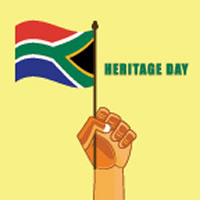
Heritage Day gives us an opportunity to learn about each other’s cultures and celebrate our differences.
This year marks 20 years since that first Heritage Day was celebrated in 1996 and a number of events will take place across the country to commemorate it. The main event on 24 September will feature a presidential address to the nation. The theme is “Human treasures and legends: Our living heritage”.
Heritage is both tangible and intangible. Tangible heritage refers to buildings, historic places, artefacts and monuments, while intangible are attributes that we have inherited from the past generations such as language and knowledge.
Celebrating our heritage means embracing our cultures, oral and traditional expressions, languages, performing arts, social practices and rituals, food and other aspects that make us unique.
In South Africa, we also celebrate our liberation heritage when we recall the sacrifices made in the struggle for freedom and also honour those who dedicated their lives to ensuring that the country achieved freedom and democracy.
Celebrating and reflecting on our liberation heritage helps promote national building and brings all the people of South Africa closer together.
As part of celebrating our liberation heritage, this year South Africa, in partnership with Mozambique, will mark the 30th anniversary of the death of former Mozambican President Samora Moises Machel.
On 19 October 1986, Machel and 34 of his country men and women died in a plane crash.
He had attended a Frontline States summit in Lusaka, Zambia, and was on his way back to Maputo, Mozambique aboard his presidential plane. The plane mysteriously crashed on the on the hills of Mbuzini, in Mpumalanga, South Africa.
In 1998, South Africa’s Truth and Reconciliation Commission launched a special investigation into Machel’s death. However, the special investigation didn’t reveal anything new.
Machel became the first black president of Mozambique in 1975, after the Front for the Liberation of Mozambique (Frelimo), overcame the colonial Portuguese government in 1974.
Machel supported South African liberation fighters in their struggle against apartheid rule and allowed them to operate within Mozambique. As such, the ties between South Africa and Mozambique have been cemented over years of friendship and support.
An event marking the 30th anniversary of Machel’s death will be held on 19 October at Mbuzini in Mpumalanga.
President Jacob Zuma will address the event, which is expected to be attended by South Africans and Mozambicans.
Celebrating SA’s heritage
Celebrating SA’s heritage JoySouth Africans should draw strength from their diversity and use Freedom Park as a place to build social cohesion and focus on an inclusive future.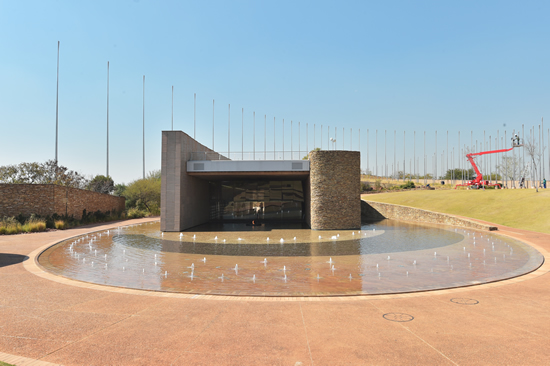
This is the view of Freedom Park CEO Jane Mufamadi who spoke to Vuk’uzenzele about the importance of celebrating heritage.
Situated at the top of Salvokop in Pretoria, Freedom Park is a heritage destination that challenges visitors to reflect on South Africa’s past, improve our present and build on our future as a united nation.
“Freedom Park is a monument and memorial established to honour those who sacrificed for freedom and humanity.
“It serves as a reminder that as we build a united future, we must dare not repeat the horrible mistakes and divisive decisions of the past,” she said.
Mufamadi believes that it is important for every nation to preserve its heritage because of the important role it plays in building the nation.
“A nation without heritage is like an individual without a soul.”
She added that preserving the heritage of the country will play an important role in developing the nation.
“If you look at countries that are doing well, they base their approach on their heritage and their development is based on their own culture and uniqueness.”
Mufamadi said that Freedom Park was in the process of preserving the heritage of the country by digitising the Pan African Archives.
This is an educational tool that will be linked to the Knowledge Centre to enable our visitors to learn about African liberation history in the exhibition area, to find more interactive material on touchscreens and to access academic material on the subject that is shared with other people everywhere electronically.”
Ekurhuleni rolls out eBooks
Ekurhuleni rolls out eBooks lebangThe days of travelling to the library to access reading material are a thing of the past for residents of Ekurhuleni. Residents can now use advanced technology to borrow books online.
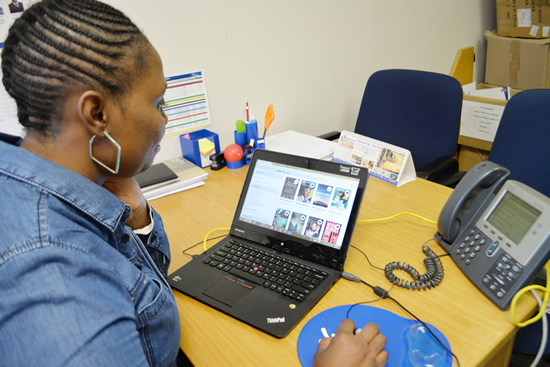 The City of Ekurhuleni hopes that the eBooks inititiave that is being rolled out will foster a culture of reading and learning among residents.
The City of Ekurhuleni hopes that the eBooks inititiave that is being rolled out will foster a culture of reading and learning among residents.
An eBook is an electronic version of a printed hard copy book, which will be available to residents to use for a period of two weeks. Once the two weeks is up the electronic copy will no longer be available.
In an interview with Vuk’uzenzele, Ekurhuleni Metro Municipality spokesperson Themba Gadebe said the city’s ultimate aim is to provide convenient access to books at any given time, without residents having to walk into the library.
“We live in a world which has been advanced by Information Technology (IT) and it’s important that as a city with a large population of young people, we continuously introduce ways for them to better themselves through reading and learning.
“We are also trying to have an element of convenience by having residents being able to read from anywhere at any time, be it from their laptops or phones,” said Gadebe.
To download an eBook available at the library, one must log onto the municipality’s website, which is: www.ekurhuleni.gov.za, where they will find a link that will enable them to register and borrow a book.
The book in question will be available for a particular time, after which it will be retrieved and made available to the next user who wishes to use the book.
According to Gadebe, this will ensure that people don’t sit with a book for too long, thus preventing others from using it.
“Initially we had books circulating among a lot of people and as one can imagine, the condition of the books continued to deteriorate over time.
“We also had challenges of people returning these books late and sometimes not returning them at all so this will hopefully address those challenges,” said Gadebe.
He added that although the initiative hasn’t been officially launched, the city is a embarking on an educational drive throughout communities, to empower residents with the knowledge of the system and familiarise themselves with the programme.
According to Gadebe, the initiative has been well received by residents.
“We are thrilled about this move. We need to motivate our people to also match up with the world standards.
“We need to create a calibre of youth that will be competitive even when dealing with youth from other countries and the advanced world,” said Gadebe.
Fish farmer living his dream
Fish farmer living his dream lebangWhen Bhekuyise Ngema got a job in a seafood store, he developed a love for fish that motivated him to start his own business. Ngema (51) is the owner of Sofoco Fish Farm based in Mandeni, north of Durban, KwaZulu-Natal.
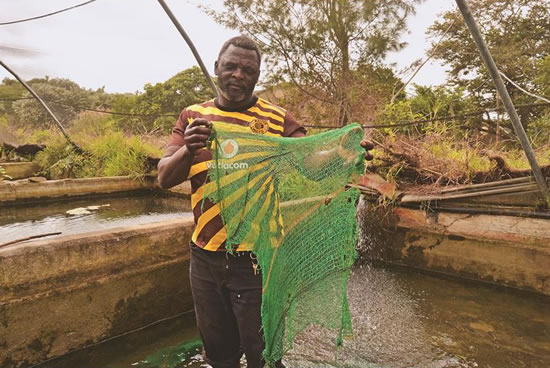 The freshwater fish farm is named after the biggest river in the Mbizimbelwe area in Mandeni. It has 20 tunnels filled with different kinds of freshwater fish, which includes 12 different kinds of koi and goldfish, which he breeds and sells for a living.
The freshwater fish farm is named after the biggest river in the Mbizimbelwe area in Mandeni. It has 20 tunnels filled with different kinds of freshwater fish, which includes 12 different kinds of koi and goldfish, which he breeds and sells for a living.
“I love what I do. I used my knowledge as a plumber and electrician to dig a six-foot deep borehole and installed a second-hand pump to produce water for the tunnels. The borehole produces 165 litres per minute but I still need two more water pumps to help the one I have. Fish need clean water and space for oxygen, so I use my knowledge as a plumber to ensure that they get what they need,” said Ngema.
Ngema’s business won the Smallholder Award in 2015.
He spends most of his time with the fish to ensure their wellbeing. He feeds them, removes the eggs and places them in a different tunnel where they are fertilised. The fertilised fish are then moved to yet another tunnel.
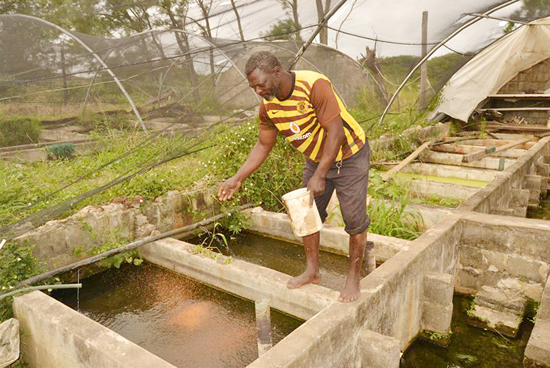 Ngema said he hopes his business can inspire young people to start their own businesses.
Ngema said he hopes his business can inspire young people to start their own businesses.
“I am trying to show young people that you can achieve your dreams, no matter how bad your situation might be. I want them to know that starting a business does not need much capital but you can start small and grow. You cannot get anything if you are sitting at home doing nothing.”
His biggest goal for his business is to grow and supply big shops with fresh fish. Sofoco Fish Farm does not have access to a computer or any modern technology he has a manual filling system to keep record of all his business transactions and other paper work.
He said currently his customers need to come collect the fish because he does not have a car to deliver them.
* Sboniso Dlamini is a writer for North Coast Courier.
Gauteng learners get educational equipment
Gauteng learners get educational equipment JoyFifty schools in Gauteng have become the latest recipients of Information Communication and Technology (ICT) equipment that will ensure effective teaching and learning in the province.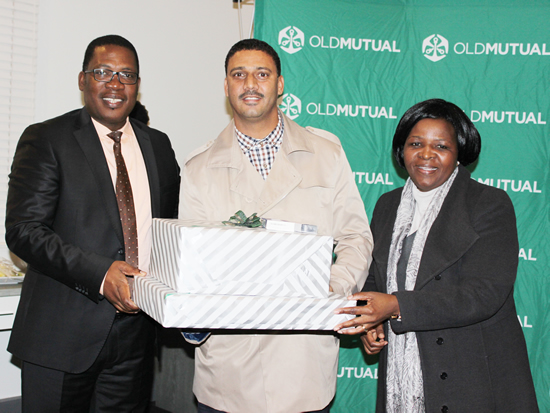
The equipment, donated by Old Mutual SA Limited, will assist the Gauteng Department of Education in its drive to ensure that more learners in the province have access to a wealth of information relating to their curriculum needs through the use of ICT.
Schools were given overhead data projectors, laptops, modems and USBs.
Over 165 schools in Gauteng have thus far benefitted from the programme, in the past three years.
MEC for Education Panyaza Lesufi encouraged businesses to work with the department.
“As we enter the fourth industrial revolution, it is vital that we use ICT to improve the economy. We need to use education to solve social ills. I shall only rest the day the number of social grants are lower and the number of graduates higher,” said MEC Lesufi.
He urged principals to embrace ICT and communities to protect and support the schools.
“Protect what Old Mutual has given us; ICT is the future,” he said.
The project, now on its third year, is part of the Corporate Social Investment initiative by Old Mutual to support the departmental vision of paperless classrooms.
Clarence Nethengwe, the General Manager Distribution at Old Mutual, applauded MEC Panyaza Lesufi for his introduction of ICT in schools.
“Our company is witnessing the good things that the department is doing. Old Mutual will continue to support initiatives that seek to advance education,” he said.
Nicholas Chauke and Margaret Phalane, principals of Modiri Technical High School and Pretoria Secondary School respectively, praised the department and Old Mutual for giving them the “tools” to do their work efficiently.
*Jeff Mmope works for the Gauteng Department of Education.
Get your teeth into health
Get your teeth into health Estelle GreeffIf you have not been to the dentist lately, you may need to consider making an appointment soon.
 Good dental hygiene is important to improve your overall health and wellbeing.
Good dental hygiene is important to improve your overall health and wellbeing.
September is National Oral Health Month and Vuk’uzenzele has put together some tips to help you on your way to good oral hygiene.
Why is it important to have good oral health?
Keeping your teeth free of plaque, acidity and bacteria is vital for protecting them from unpleasant and often even painful and harmful oral diseases, such as gum disease or cavities.
What is gum disease?
Severe gum disease, often referred to as periodontitis, is an infection that affects the soft tissue and bone supporting the teeth.
What are the symptoms of gum disease?
- Swollen, red gums that feel tender to the touch
- New spaces appearing between your teeth
- Sores and/or pus between your teeth and gums
- Bad smelling breath
- An unpleasant taste in your mouth
- Tooth loss.
What causes gum disease?
It is thought that gum disease is caused by plaque, which is the creamy white substance that forms on your teeth after eating certain sugars. Plaque consists mostly of bacteria and can be removed by brushing your teeth. However, plaque commonly reforms within 24 hours and it is therefore important to brush and floss your teeth regularly.
What are cavities?
Cavities are areas on your teeth where permanent damage has occurred, resulting in little holes. You may have heard of cavities being referred to as tooth decay or caries. Most people will develop cavities, which can occur at any age. If left untreated, cavities can grow and penetrate into deeper layers of the tooth.
What are the symptoms of a cavity?
If you have a cavity, you may experience the following symptoms:
- Toothache
- Sensitive teeth - pain or discomfort when eating of drinking something cold, hot or sweet
- Pain when you bite down
- A visible hole in your tooth.
What can I do to prevent oral disease?
These basics are a good place to start, and your dentist will tell you if there are any further steps you need to take:
- Brush your teeth with fluoride toothpaste at least twice a day
- Rinse your mouth out with anti-microbial mouthwash daily
- Reduce your intake of sugar and try to maintain a healthy, balanced diet
- Stop smoking
- Visit your dentist regularly.
* Supplied by: Government Employees Medical Scheme
Growing North West tourism
Growing North West tourism lebangThe North West Department of Tourism is stepping up efforts to attract more visitors to the province.
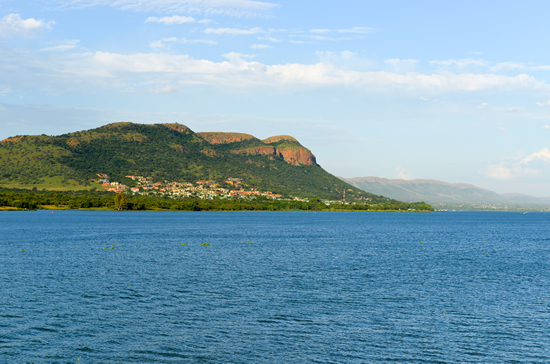 The province has impressive tourist attractions like the majestic Sun City, Pilanesburg National Park, Haartebeespoort Dam and the Magaliesburg mountain range.
The province has impressive tourist attractions like the majestic Sun City, Pilanesburg National Park, Haartebeespoort Dam and the Magaliesburg mountain range.
The department has put together a campaign to attract more visitors to the North West with the aim of making it the fourth most visited province in the country. Currently, the province is the seventh most visited province in the country.
MEC of Tourism Desbo Mohono said the province wants to claim a bigger share of the tourists visiting the country.
“Through our brand innovation and marketing strategy called “A re yeng Bokone Bophirima”, the province has lined up a series of events that will woo tourists from across the globe as well as fuel the Sho’t Left campaign, especially this month.”
MEC Mohono said for the North West to succeed in increasing the number of visitors to the province, more young people need to be involved in the sector.
As such, the province will sponsor young people to attend the National Tourism Career Exhibition Expo (NTCE).
“This year, we will be taking 45 tourism learners to the NTCE in Bloemfontein. The purpose of the NTCE is to expose our youth to various career options within broader tourism industry.”
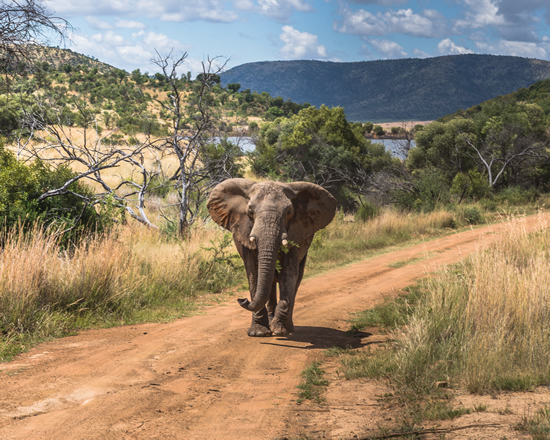 She added that the department, through its agency - the North West Tourism Board - owns two hotel schools based in Mafikeng and Taung where young people are able to pursue courses in hospitality management, professional cookery, and food and beverage. Upon successful conclusion of these courses they can be hotel managers, restaurant managers and lodge owners.”
She added that the department, through its agency - the North West Tourism Board - owns two hotel schools based in Mafikeng and Taung where young people are able to pursue courses in hospitality management, professional cookery, and food and beverage. Upon successful conclusion of these courses they can be hotel managers, restaurant managers and lodge owners.”
The MEC said the province also wants to attract international visitors. She recently visited the United Kingdom and Germany in an effort to market the province to international tourists.
“As a department, we recognise the importance and contribution of international tourists towards growing our provincial economy.
“We commit to using tourism to grow our economy and create jobs.”
Ikaheng builds the community
Ikaheng builds the community Estelle GreeffThe spirit of Ubuntu is alive and well in the community of Mafora in Bloemfontein.
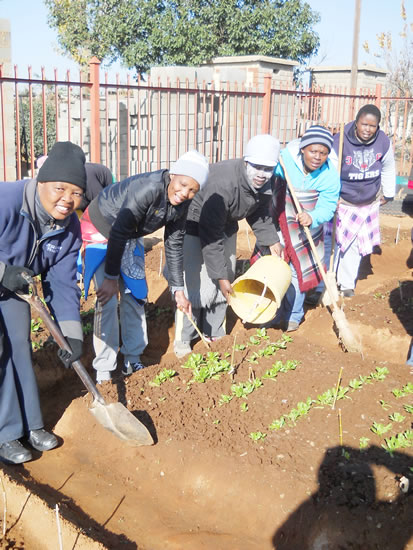 When the people of Mafora township, Bloemfontein, saw what an unsettling number of struggling elderly people and orphans lived in their community, they came up with Ikaheng Project in 2014.
When the people of Mafora township, Bloemfontein, saw what an unsettling number of struggling elderly people and orphans lived in their community, they came up with Ikaheng Project in 2014.
Ikaheng means Build Yourselves Up in Sesotho.
This project aims to help alleviate hunger, foster community-based care and help eliminate unemployment.
Since 2014 the project has been receiving funding from the Independent Development Trust and the provincial Department of Public Works. The three-year funding allows Ikaheng to pay a stipend to communitiy members working on the project.
Ikaheng consists of 60 community members who help other community members. Each of the 60 members get a stipend of R1 000 each month. Ikaheng project’s manager Ashley Phuthi said they noticed that a lot of people in their neighbourhood, particularly the elderly and orphans, did not have access to good nutrition. Their solution was to start a food garden.
Ikaheng community members plant vegetables which they supply to over 30 households and also sell to raise funds.
“We were given a three-year contract for the project. This project helps a lot of people and gives work to many more.We want to continue helping people,” said Phuthi.
“We also need help with food, because most of the people that we help don’t have food”
Gloria Lavase (44) has been part of the project for almost three years. “Since I came here, there have been many changes in my life. I used to struggle a lot, but since I have joined the project I can give my children a better life with the little that I get from here.”
“I sat at home for a long time without work, but now it’s better because I can provide for my children. I’m very grateful for the project; it made me a woman amongst women,” said Lavase.
Tankiso Molefe first received help with his wheelchair and is now part of the project to help others. “I would really love to receive art resources so that I can teach children art because I’m really good at drawing and painting,” said Molefe.
Phuthi said they are struggling with funds, but helping others gives him joy: “Helping people is my love; it’s my passion.”
“Seeing someone smile makes me happy, it’s not about getting something in return or anything like that. I’ve taken this project as my own child,” he said.
Internships: Agriculture, Forestry and Fisheries 2017/2018
Internships: Agriculture, Forestry and Fisheries 2017/2018 Estelle GreeffStipend R86 589.76 annum depending on the level of qualifications.
The Department of Agriculture, Forestry, and Fisheries presents exciting opportunities/positions for the unemployed graduates between the ages of 18 and 35 through its Experiential Training and Internship Programme. Successful applicants will be appointed as interns for 12 months and will undergo on-the-job development training in technical, professional, public service, business and life skills relevant and crucial for them to enter the formal job market. The opportunities/positions presented are categorised as follows:
1. Agri-export Technologists Programme [Ref: AETP/2017] (Fax: 086 605 8457; E-mail: aetpintern@humanjobs.co.za)
This category of opportunities calls for qualified unemployed graduates in possession of a 3-year (minimum) national qualification in one of the following fields: Agricultural Sciences, Food Technology or Environmental Health to participate in the Agri- export Technologists Programme to gain both the practical experience and employment in the perishable products export industry of South Africa. Successful candidates will be placed with relevant industry organisations under the guidance and leadership of the Perishable Products Export Control Board (PPECB). Candidates applying for this category must motivate on a separate page (not less than 300 words) why they think they should be considered for this programme and will be subjected to further adjudication by PPECB for final selection. Applicants must be entering the internship programme in government for the first time.
2. Development of Young Producer and Entrepreneurial Programme
This category of opportunities calls for qualified unemployed graduates with the commitment, passion and interest to become farmers/entrepreneurs. Their ultimate goal must be to be businessmen and businesswomen in the agriculture, forestry and fisheries sectors. Candidates applying for this category must motivate on a separate page (in not less than 300 words) why they think they should be considered for this programme and will be subjected to an assessment tool for final selection. The reference number is indicated next to the organisation on the table below. Unemployed graduates from Agricultural Training Institutes (Colleges of Agriculture) are encouraged to apply. Candidates must be entering the internship programme in government for the first time.
3. Employment/job seekers
This category of opportunities calls for qualified unemployed graduates in fields of study required by the Department of Agriculture, Forestry, and Fisheries. The reference number is indicated next to the directorate/organisation in the table below. Candidates must be entering the internship programme in government for the first time.
4. Experiential Training (Stipend: R 49 861.00 per year)
The candidates applying for this category are those currently registered for undergraduate study programmes in agriculture, forestry and fisheries and are required to do experiential training as a requirement for them to graduate. Applicants must have a referral letter from the institution of higher learning. The reference number is indicated next to the directorate/organisation in the table below.
Specific requirements
Applicants for the experiential training, job seekers and Development of Young Producer and Entrepreneurial categories will be allocated in the directorates/organisations listed in the table below and must be entering the internship programme in government for the first time.
|
Directorate / Organisation |
Reference |
Number of interns |
Placements |
Qualification |
Major subjects (any one of the following |
|
Agriculture Opportunities (Fax: 086 604 6600; E-mail: agricintern@humanjobs.co.za) |
|||||
|
Communication Services (Pretoria) |
CSPTA/01 |
2 |
Pretoria (Head office) |
B. degree/National diploma/Experiential training |
Feature writing; Print Media and Practice Journalism |
|
CSPTA/02 |
1 |
Pretoria (Head office) |
B. degree/National diploma/Experiential training |
Communication; Public Relations; Events Management |
|
|
CSPTA/03 |
1 |
Pretoria (Head office) |
B. degree/National diploma/Experiential training |
Graphic Design |
|
|
Food Safety and Quality Assurance |
FSQA/1 |
1 |
Pretoria (Head office) |
B. degree/National diploma |
Plant Production; Plant Pathology; Entomology |
|
FSQA/2 |
1 |
Pretoria (Head office) |
B. degree/National diploma |
Plant Pathology; Entomology |
|
|
FSQA/3 |
1 |
Cape Town (Stellenbosch) |
B. degree/National diploma/Experiential training |
Analytical Chemistry; Chemistry |
|
|
FSQA/4 |
1 |
Cape Town (Stellenbosch) |
B. degree/National diploma |
Microbiology; Food Chemistry |
|
|
Sector Education and Training |
SET/01 |
2 |
Pretoria (Head office) |
B. degree/National diploma/N6/Experiential training |
Office Management; Public Administration; Business Administration |
|
|
SET/02 |
2 |
Pretoria (Head office) |
B. degree/National diploma |
Marketing; Communication; Public Relations |
|
Internal Audit |
IA/01 |
1 |
Pretoria (Head office) |
B. degree/National diploma |
Internal Audit |
|
Knowledge and Information Management |
KIM/01 |
1 |
Pretoria (Head office) |
B. degree/National diploma/N6 |
Information Management; Informatics; Communication; Public Management& Governance |
|
Plant Health |
PH/01 |
2 |
Pretoria (Head office) |
B. degree |
Plant Pathology; Entomology; Plant Protection; Crop Protection; Agriculture |
|
Sector Transformation |
ST/01 |
2 |
Pretoria (Head office) |
B. degree/National diploma |
Agricultural Economics; Agricultural Management; Policy Development; Community Development; Project Management |
|
BBBEE Charters Compliance |
BCC/01 |
1 |
Pretoria (Head office) |
B. degree |
Agricultural Economics; Economics; Business Management |
|
Plant Production |
PP/01 |
2 |
Pretoria (Head office) |
B. degree |
Horticulture; Agronomy; Plant Production |
|
PP/02 |
2 |
Pretoria (Roodeplaat) |
B. degree. |
Plant Physiology; Botany |
|
|
Strategic Planning |
SP/01 |
1 |
Pretoria (Head office) |
B. degree/National diploma |
Strategic Planning; Strategic Management; Economics; Project Management; Programme Management |
|
Marketing |
MKT/01 |
1 |
Tshwane Fresh Produce Market |
B. degree |
Accounting; Auditing; Business Management; Economics; Financial Management and Agricultural Marketing |
|
MKT/02 |
1 |
Durban Fresh Produce Market |
|||
|
MKT/03 |
1 |
Cape Town Fresh Produce Market |
|||
|
MKT/04 |
1 |
APAC – Boksburg |
|||
|
Animal Production |
AP/01 |
2 |
Pretoria (Head office) |
B. degree/National diploma |
Pasture Science; Grassland Science; Wildlife Management; Animal Production; Poultry Science; Beef Production; Dairy Production; Small Stock Production |
|
AP/02 |
1 |
P/Maritzburg |
B. degree/National diploma |
Poultry Production; Poultry Science |
|
|
Financial Accounting |
FA (PTA) |
2 |
Pretoria (Head office) |
B. degree/National diploma/N6 |
Financial Accounting; Business Management |
|
Information Communication Technology |
ICT (PTA)/01 |
1 |
Pretoria (Head office) |
B. degree/National diploma |
Desktop Support |
|
ICT (PTA)/02 |
1 |
Business/Public Management |
|||
|
ICT (PTA)/03 |
1 |
Electronic Engineering |
|||
|
ICT (PTA)/04 |
1 |
Server Management/ Support |
|||
|
Human Resources Management |
HRM/01 |
4 |
Pretoria (Head office) |
B. degree/National diploma |
HRM; Public Management; Administration |
|
Inspection Services |
IS/01 |
1 |
Port Elizabeth |
B. degree/National diploma |
Horticulture; Botany; Entomology; Plant Pathology |
|
IS/02 |
1 |
Cape Town (Stellenbosch) |
B. degree/National diploma |
Food Technology; Biochemistry; Microbiology |
|
|
IS/03 |
1 |
OR Tambo International Airport |
B. degree/National diploma |
Pathology; Animal Production; Plant Production; Entomology |
|
|
IS/04 |
1 |
Nelspruit |
B. degree/National diploma |
Plant Pathology; Entomology |
|
|
Chief Directorate: Chief Information Officer |
CD:CIO/01 |
1 |
Pretoria (Head office) |
B. degree/National diploma |
Political Science; Administration |
|
Food Import and Export Standards |
FIES/01 |
2 |
Pretoria (Head office) |
B. degree/National diploma |
Animal diseases |
|
Organisational Performance |
OP/01 |
1 |
Pretoria (Head office) |
B. degree/National diploma |
Agriculture Economics; Economics; Statistics, Econometrics; Public Administration; Public Management, Monitoring and Evaluation; Auditing |
|
Facilities Management |
FC/01 |
1 |
Pretoria (Head office) |
B. degree/National diploma/N6 |
Public Management; Administration; Finance; Procurement; Building Science; Construction Management; Property Management; Build Environment |
|
Agricultural Inputs Control |
AIC/01 |
2 |
Pretoria (Head office) |
B. degree |
Animal Science; Animal Nutrition; Soil Science; Agronomy; Crop Nutrition; Soil Fertility |
|
Small Holder Development |
SHD/01 |
2 |
Pretoria (Head office) |
B. degree/National diploma |
Agricultural Economics; Agricultural Management; Extension and Rural Development; Plant Production; Animal Production |
|
Employee Relations |
ER/01 |
1 |
Pretoria (Head office) |
B. degree/National diploma |
Labour Relations |
|
ER/02 |
1 |
Pretoria (Head office) |
B. degree/National diploma/N6 |
Human Resources Management; Public Administration |
|
|
CASP Office |
CASP/01 |
1 |
Pretoria (Head office) |
B. degree |
Agricultural Economics |
|
Policy Research and Support |
PRS/01 |
1 |
Pretoria (Head office) |
B. degree |
Animal Production; Plant Science; Agricultural Economics; Biological Science |
|
Agro-Processing Support |
APS/01 |
1 |
Pretoria (Head office) |
B. degree |
Agricultural Economics; Agribusiness |
|
Veterinary Public Health |
VPH/01 |
1 |
Pretoria (Head office) |
B. degree/National diploma/N6 |
Public Administration; Human Resources Management; Project Management |
|
VPH/02 |
1 |
Pretoria (Head office) |
B. degree |
Animal Health; Veterinary Public Health; Epidemiology; Anatomy; Physiology |
|
|
Employee Development and Performance Management |
EDPM/01 |
1 |
Pretoria (Head office) |
B. degree/National diploma |
Management of Training; Human Resource Development; Advanced Management of Training |
|
EDPM/02 |
1 |
Pretoria (Head office) |
B. degree and SACSSP registration |
Social Work; Psychology; Counseling; Psychometry; Community Wellness |
|
|
EDPM/03 |
1 |
Pretoria (Head office) |
B. degree/National diploma |
Environmental Health; Nursing |
|
|
Africa Relations |
AR/01 |
1 |
Pretoria (Head office) |
B. degree |
International Relations; Political Science |
|
Americas, Australia, Europe and Middle East Relations |
AAEMER/01 |
1 |
Pretoria (Head office) |
B. degree |
International Relations; Political Science |
|
Cooperative and Enterprise Development |
CED/01 |
1 |
Pretoria (Head office) |
B. degree |
Agricultural Economics; Economics |
|
Subsistence Farming |
SF/01 |
1 |
Pretoria (Head office) |
B. degree/National diploma |
Agricultural Economics; Plant Production; Animal Production |
|
Supply Chain Management |
SCM/PTA |
1 |
Pretoria (Head office) |
B. degree/National diploma |
Accounting; Business Economics; Economics |
|
National Extension Support |
NES/01 |
1 |
Pretoria (Head office) |
B. degree |
Communication; Marketing; Public Relations |
|
Sector Colleges |
SC/01 |
1 |
Pretoria (Head office) |
B. degree/National diploma |
Logistics; Supply Chain Management; Public Administration |
|
Provincial and SOEs Performance Monitoring |
PSPM/01 |
1 |
Pretoria (Head office) |
B. degree/National diploma |
Agriculture Economics; Economics; Statistics; Econometrics; Public Administration; Public Management; Monitoring and Evaluation |
|
Risk Management and Investigation |
RMI/01 |
1 |
Pretoria (Head office) |
B. degree/National diploma |
Risk Management |
|
Genetics |
GR/01 |
1 |
Pretoria (Roodeplaat) |
B. degree/National diploma |
Crop Production; Agronomy; Fruit Production; Horticulture |
|
Programme Development Support |
PDS/01 |
1 |
Pretoria (Head office) |
B. degree/National diploma |
Public Admin; Project Management; Monitoring and Evaluation |
|
Fisheries Opportunities (Fax: 086 604 6480; E-mail: fisheyintern@humanjobs.co.za) |
|||||
|
Communication Services |
CSCT/01 |
2 |
Cape Town |
B. degree/National diploma/Experiential training |
Writing; Media studies; Journalism; Multimedia |
|
Monitoring and Surveillance |
MS/01 |
1 |
Cape Town |
B. degree/National diploma |
Silviculture; Environmental Management; Forestry Engineering; Fire protection; Forestry Mensuration; Inventory; Forestry Management; Forest Policy and Law; Human Resource Management |
|
Fisheries Protection Vessels |
FPV/01 |
1 |
Cape Town |
B. degree/National diploma |
GIS |
|
FPV/02 |
1 |
Cape Town |
Business Administration; Information Administration; Financial and Procurement Management; Human Resource Management |
||
|
Information Communication Technology |
ICT (CT) |
2 |
Cape Town |
B. degree/National diploma |
Java Desktop support; networking; Software Development; Oracle; Database Development |
|
Integrated Human Resources Management |
IHRM/01 |
4 |
Cape Town |
B. degree/National diploma/N6/Experiential Training |
Management of Training; Personnel Management; Industrial Psychology |
|
Sustainable Aquaculture Management |
SAM/01 |
1 |
Cape Town |
B. degree/National diploma
|
Aquaculture; Ichthyology; Marine Science; Biology. |
|
SAM/02 |
1 |
Cape Town |
Public Management; Project Management; Public Service Delivery; Policy Studies |
||
|
SAM/03 |
1 |
Cape Town (Sea Point) |
B. degree |
Animal Health; Anatomy; Physiology; Parasitology; Microbiology; Toxicology Biosecurity; Farm Management |
|
|
SAM/04 |
1 |
Cape Town (Sea Point) |
B. degree/National diploma |
Zoology; Botany; Microbiology |
|
|
Compliance |
C/01 |
1 |
Cape Town |
B. degree/National diploma |
Animal Studies |
|
C/02 |
1 |
Kalk Bay |
|||
|
C/03 |
1 |
Hermanus |
|||
|
C/04 |
1 |
Gansbaai |
|||
|
Offshore and High Seas Fisheries Management |
OHSFM/01 |
1 |
Cape Town |
B. degree/National diploma |
Administration; General Management |
|
Aquaculture Technical Services |
ATS/01 |
1 |
Eastern Cape (Hamburg) |
B. degree Hons |
Aquaculture |
|
ATS/02 |
1 |
Cape Town (Foretrust) |
|||
|
ATS/03 |
1 |
Free State (Gariep Dam) |
Agricultural Economics |
||
|
ATS/04 |
1 |
Pretoria |
|||
|
Revenue Management |
RM/01 |
2 |
Cape Town |
B. degree/National diploma/N6 |
Accounting; Auditing; Financial Management; Cost and Management |
|
Aquaculture and Economic Development
|
AED/01 |
1 |
Cape Town |
BSc |
Aquaculture; Zoology; Botany; Phycology; Ichthyology; Environmental Management; Environmental Sciences. |
|
AED/02 |
1 |
B. degree/National diploma |
Marketing; Public Relations Management; Communication |
||
|
Intergovernmental and International Relations |
IIC/01 |
1 |
Cape Town |
B. degree/National diploma |
International Relations: Communication; Political Science; Research |
|
Inshore Fisheries Management |
IFM/01 |
2 |
Cape Town |
B. degree |
Resource Management; Environmental Management; Administration; Biological Sciences. |
|
Socio Economic Development |
SED/01 |
1 |
Cape Town |
B. degree/National diploma |
Natural Science; Environmental Management; Community Development; Marine Related Tourism |
|
Office of DDG Fisheries |
ODDGF/01 |
1 |
Cape Town |
B. degree/National diploma |
Administration; Financial Management |
|
Resource Research |
RR/01 |
1 |
|
B. degree/National diploma/N6 |
Office Management; Public Administration |
|
Financial Management (CT) |
FMCT/01 |
2 |
Cape Town |
B. degree/National diploma/N6 |
Budget; Accounting; Auditing |
|
Stakeholder Engagement |
SE/01 |
1 |
Cape Town |
B. degree/National diploma/N6 |
Business/Office Administration; Information Management; Office Communication; Office Finance; Client Service |
|
Supply Chain Management (Cape Town) |
SCMCT/01 |
2 |
Cape Town |
B. degree/National diploma |
Logistics Demand and Acquisition; Assets Disposal; Contract Tenders; Transport Management; Travel and Events Management |
|
Research Support and Administration |
RSA/01 |
1 |
Cape Town |
B. degree/National diploma/N6 |
Electronics; Digital Systems; Programming |
|
RSA/02 |
1 |
Cape Town |
B. degree/National diploma/N6 |
Mechanics; Mechanical Engineering Design; Applied Strength of Materials |
|
|
Small Scale Fisheries
|
SSF/01 |
1 |
Cape Town |
B. degree/National diploma
|
Geography; Water Science; Oceanography; Zoology, Developmental Studies
|
|
SSF/02 |
1 |
East London |
|||
|
Forestry Opportunities (Fax: 086 604 6578; E-mail: foresintern@humanjobs.co.za) |
|||||
|
Water Use and Irrigation Development |
WUID/01 |
2 |
Pretoria (Silverton) |
B. degree/National diploma |
Soil Science; Plant Production; IrrigationManagement |
|
Forestry Management (Eastern Cape) |
FMEC/01 |
1 |
Katberg |
B. degree/National diploma |
Silviculture; Environmental Management; Forestry Engineering; Fire protection; Forestry Mensuration; Inventory; Forestry Management; Forest Policy and Law; Human Resource Management |
|
FMEC/02 |
1 |
Willowvale |
|||
|
FMEC/03 |
1 |
Ntsubane Estate |
|||
|
FMEC/04 |
1 |
Ntywenka |
|||
|
FMEC/05 |
1 |
Qunu |
|||
|
FMEC/06 |
1 |
Nomadamba |
|||
|
Woodlands and Natural Resource Management |
WNRM/01 |
1 |
Bulembu Estate |
B. degree/National diploma
|
Forestry Management; Siviculture; Fire Protection; Community Safety
|
|
WNRM/02 |
1 |
Bomvana Estate |
|||
|
Forestry Management (Limpopo and Mpumalanga) |
FMLM/01 |
1 |
Salique |
B. degree/National diploma |
Silviculture; Forestry Engineering; Fire protection; Forestry Management |
|
FMLM/02 |
2 |
Voorspoed |
|||
|
FMLM/03 |
1 |
Rossbach |
|||
|
FMLM/04 |
1 |
Ermelo |
B. degree/National diploma |
Forestry; Community Development; Nursery Practice |
|
|
FMLM/05 |
1 |
Makhado |
|||
|
FMLM/06 |
1 |
Nelspruit |
B. degree/National diploma |
Forestry; Fire management; Forest Protection; Forest Management |
|
|
FMLM/07 |
1 |
Makhado |
|||
|
Forestry Management (KwaZulu-Natal) |
FMKZN/01 |
2 |
Pietermaritzburg |
B. degree/National diploma |
Forestry; Environmental Management; Land Use System; Natural Resource Management |
|
FMKZN/02 |
1 |
Pietermaritzburg |
B. degree |
Geographical Information System (GIS); Knowledge Information System |
|
|
FMKZN/03 |
1 |
Pietermaritzburg |
B. degree/National diploma
|
Forestry Subjects
|
|
|
FMKZN/04 |
1 |
Hlokozi |
|||
|
FMKZN/05 |
1 |
KwaGubeshe |
|||
|
FMKZN/06 |
1 |
Weza Forestry Estate |
B. degree/National diploma/Experiential Training |
Forestry; Environmental Management |
|
|
FMKZN/07 |
1 |
Sokhulu/Mthunzini Plantation |
|||
|
FMKZN/08 |
1 |
Dukuduku Forestry Estate |
|||
|
Forestry Management (other regions) |
FMOR/01 |
2 |
Bloemfontein |
B. degree/National diploma |
Community Forestry; Fire Management; Forestry & Climate Change |
|
FMOR/02 |
1 |
Mafikeng |
Forestry Management; Fire Ecology; Environmental Management; Community Development |
||
|
FMOR/03 |
1 |
Pretoria |
Forestry |
||
|
FMOR/04 |
1 |
Bellville |
|||
|
FMOR/05 |
1 |
Kimberley |
|||
|
Forestry Regulations and Oversight |
FRO/01 |
1 |
Pretoria (Head office) |
B. degree/National diploma |
Forestry Modules; Environment Modules; Project Management; Policy Development; Geography |
|
FRO/02 |
1 |
Geography; Spatial Analysis; Cartography; Geographical Information Systems |
|||
|
FRO/03 |
1 |
Knowledge and Information Management |
|||
|
Industrial Placement Opportunities (Fax: 086 604 6597; E-mail: industintern@humanjobs.co.za) |
|||||
|
Industrial Placement
|
GZFT/01 |
1 |
Elliot |
B. degree |
Animal Production; Plant Production; Agro-Processing; Feedlot Management |
|
MOZ/01 |
1 |
Durban |
B. degree/National diploma |
Food Micro; Food Technology; Food Science; Food Processing; Research and Development |
|
|
TF/01 |
1 |
Thabazimbi |
Animal Production; Crop Production |
||
|
ARC/01 |
2 |
Pretoria ARC, Central Office, VOPI, API,PPRI |
BSc /Hons/MSC Agric |
Economics; Extension |
|
|
MAN/01 |
1 |
Pretoria |
B. degree |
Animal Husbandry; Breeding; Nutrition; Animal Health; Veld and Pasture Management |
|
|
HEF/01 |
1 |
Nkandla |
B. degree/National diploma |
Animal Health |
|
|
FFM/01 |
1 |
Durban |
Food Science; Food Technology |
||
|
KRB/01 |
2 |
Balfour (Mpumalanga) |
B.Sc. |
Food Science; Animal Science; Agric Economics |
|
|
LCC/01 |
1 |
Pretoria (Centurion) |
B. degree/National diploma |
Animal Science |
|
|
ZAC/01 |
2 |
North West |
B.Sc. |
Animal Health; Microbiology; Animal Science |
|
|
MAP/01 |
1 |
Bronkhorstspruit |
B. degree/National diploma |
Crop Production; Agro-Processing; Agriculture |
|
|
CWM/01 |
1 |
Durban |
Food Science; Food Nutrition |
||
|
INAQ/01 |
1 |
Gauteng (Hekpoort) |
BSc (Hons) |
Aquaculture/Ichthyology |
|
|
LUNF/01 |
1 |
Mpumalanga Lydenburg |
|
|
|
|
WCA/01 |
1 |
East London |
|
|
|
|
SFCC/*01 |
1 |
Saldanha Bay |
|
|
|
|
RH/01 |
1 |
Hermanus |
|
|
|
|
MOLF/01 |
1 |
Paarl |
|
|
|
|
LAFTS/01 |
1 |
Polokwane |
B. degree/National diploma |
Food Science |
|
|
Development of Young Producer and Entrepreneurship Opportunities (Fax: 086 605 8460; E-mail: dypeintern@humanjobs.co.za) |
|||||
|
Development of Young Producer and Entrepreneurship |
LENT/01 |
1 |
Free State (Bainsvlei) |
B. degree/National diploma |
Crop Science; Animal Science |
|
|
THITA /01 |
1 |
Free State (Tweespruit) |
|
Crop Science |
|
|
MODU /01 |
1 |
Free State (Municipal park) |
|
Agroforestry; Crop Science |
|
|
SOF/01 |
1 |
Limpopo (Chuenesspoort) |
|
Crop Science |
|
|
MONA /01 |
1 |
Limpopo (Modimolle) |
|
Crop Science; Animal Science |
|
|
KHUP /01 |
1 |
North West (Rustenburg) |
|
Poultry Production; Crop Science; Animal Science |
|
|
GF/01 |
1 |
North West (Stella Village) |
|
Crop Science; Animal Science |
|
|
THOJ/01 |
1 |
North West (Phokeng) |
Crop Science |
|
|
|
DLJ/01 |
1 |
North West (Ventersdorp) |
Poultry Production; Crop Science; Animal Science |
|
|
|
SONI/01 |
1 |
North West (Kameeldrift) |
|
Crop Science; Animal Science |
|
|
MUL /01 |
1 |
Gauteng (Modderfontein) |
|
Piggery Production; Crop Science Animal Science |
|
|
MONZAI/01 |
1 |
Gauteng (Vanderbijlpark) |
|
Poultry Production; Animal Science |
|
|
DREA/01 |
1 |
Gauteng (Vanderbijlpark) |
|
Piggery Production; Crop Science; Animal Science |
|
|
MATS/01 |
1 |
Mpumalanga (White River) |
|
Forestry Management; Agroforestry; Plant Production |
|
|
SAB/01 |
1 |
Mpumalanga (Groblersdal) |
|
Poultry Production; Animal Science; Crop Science |
Enquiries: Mr P. Maesela: 012 319 7198 or Ms B. Shabalala: 012 319 7136
The Department of Agriculture, Forestry and Fisheries is an equal opportunity, affirmative action employer. Applications must be submitted on Z83 forms, obtainable from any public service department and must be accompanied by a recently updated comprehensive CV, certified copies of all qualifications and identity document and, where possible, applicants should submit copies of their academic transcripts. Failure to submit the requested documents will result in the application not being considered. The Department has the right not to make an appointment.
Applications, quoting the relevant reference number, may be posted to Human Communication Handling, P O Box 1305, Rivonia, 2128
or submitted via email:
- Agriculture Opportunities: agricintern@humanjobs.co.za or Fax: 086 604 6600;
- Forestry Opportunities: foresintern@humanjobs.co.za or Fax: 086 604 6578;
- Fisheries Opportunities: fisheyintern@humanjobs.co.za or Fax: 086 604 6480;
- Industrial Opportunities: industintern@humanjobs.co.za or Fax: 086 604 6597;
- Development of Young Producer and Entrepreneurship Opportunities: dypeintern@humanjobs.co.za or Fax: 086 605 8460 ;
- Agri-export Technologists Opportunities aetpintern@humanjobs.co.za
or Fax: 086 605 8457 or deposited in the Human Communication Handling boxes (clearly marked Interns / Trainees) at any one of the following DAFF offices:
- Pretoria (Head Office): Reception, Agriculture Place, 20 Steve Biko Street, Arcadia, Pretoria Cape Town: Reception (Ground Floor), Foretrust Building, 3 Martin Hammerschlag Way, Foreshore, Cape Town
- Stellenbosch: Reception(Support Building), Quarantine Station, Polkadraai Road, Stellenbosch
- Pietermaritzburg: Reception (5th Floor), Old Mutual Building, 185 Langalibalele Street, Pietermaritzburg
- King Williams Town: Reception (Ground Floor), Old SABC Building, 2 Hargreaves Avenue, King William’s Town
- Nelspruit: Reception (2nd Floor), Permanent Building, 27 Brown Street, Nelspruit
- Makhado: Reception (Ground Floor), Magistrates Building, 103 Landros Street, Makhado
- Mthatha: Reception (3rd Floor),PRD Building, 2 Sutherland Street, Mthatha.
Enquiries may be directed to Human Communications, tel. 011 257 8012 to verify receipt of your application.
Note: Persons with disabilities are encouraged to apply.
Closing date: 09 September 2016
If you do not hear from us within eight (8) weeks after the closing date, please consider your application unsuccessful.
The department has the right not to make an appointment.
Investing in the North West
Investing in the North West lebangThe North West Department of Tourism is planning initiatives to invest more in tourism related events to attract people to the province.
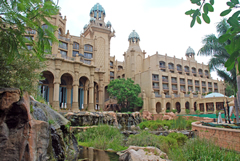 As result, the department will host an investment and trade lekgotla this month.
As result, the department will host an investment and trade lekgotla this month.
“The aim and intention is to attract big business that will be given an opportunity to invest or give their inputs in terms of tourism growth in the province.
“Among others they will be encouraged to invest in villages, townships and small dorpies in the province,” said North West MEC of Tourism Desbo Mohono.
She added that the ultimate goal is for the province to host the upcoming World Tourism Conference.
“We have state-of-the-art facilities and enough rooms to accommodate thousands of tourists. It is now time to showcase our potential as a province. We must show the world that the North West province is also capable of hosting international events.”
According to MEC Mohono, activities planned for tourism month will also add to the province getting a bigger share of the cake in the industry. The theme for Tourism Month this year is “Tourism for all”.
* Dineo Lolokwane works for the North West Department of Tourism.
Jobs: Department of Arts and Culture
Jobs: Department of Arts and Culture JoyThe Department of Arts and Culture is an equal opportunity affi rmative action employer and it is its intention to promote representatively in the Public Sector through the fi lling to this post. Persons whose transfer / promotion / appointment will promote representatively will therefore receive preference.
Deputy Director-General: Arts, Culture Promotion and Development
Remuneration Package: An all-inclusive remuneration package of R1, 299 501 per annum, consisting of a basic salary (70% of the total remuneration package), State’s contribution to the Government Employees Pension Fund (13% of basic salary) and a fl exible portion that may be structured in terms of applicable rules and guidelines.
Requirements: The applicants must be in possession of an undergraduate qualifi cation (NQF level 7) and a post graduate qualifi cation (NQF8) as recognized by SAQA • Qualifi cations in the fi eld of arts, culture and heritage, would be an added advantage • 8-10 years proven experience in a senior managerial level in government or at a parastatal. Additional requirements:• Proven strong belief and commitment to good governance, development and excellence in arts and culture sector • The ability to drive transformation in the arts, culture and heritage sector • The candidate should demonstrate sound knowledge and understanding of government legislations/Act and Regulations pertaining to an administration of a government department • Knowledge, understanding and implementation of the Acts and Regulations pertaining to the arts, culture and heritage sector • Sound understanding of the National Programme of Action and the role of arts, culture and heritage (ACH) sector • Proven capabilities in general core competencies for SMS in the Public Service including • Strategic and leadership abilities, Programme and Project Management, Change Management, Financial Management, People Management and Empowerment • Excellent written and verbal communication skills, as well as broad understanding of policies in the national and international context.
Key Performance Areas: The successful candidate will be responsible for executing the following, • Contributing to the growth and enhancement of competitive¬ness of the creative industries •Stimulating market access and increasing market demand and supply capacity across all sectors, promoting and developing the arts broadly, developing, promoting and protecting offi cial languages in South Africa • Enhancement of the linguistic diversity of the country through policy formulation and implementation •Ensure that the translation and editing services to Government Services are rendered •Coordinate and monitor the Government Language structures • Develop of multi¬lingual terminologies to support communication in offi cial languages • Support the development of human language technologies that promote the usage of and access to offi cial languages, Oversee management of the budget and resources of the branch.
Note: Applications are hereby invited from suitably and qualifi ed person to apply for the following post(s). Applications must be submitted on Form Z83, obtainable from any Government department or online at www.gov.za. All sections of the Z83 must be completed and signed and the application form should be accompanied by a comprehensive CV (including two recent and contactable referees) and Original Certifi ed Copies of the applicant’s ID and educational qualifi cations. It is the applicant’s responsibility to have foreign qualifi cations evaluated by the South African Qualifi cation Authority (SAQA) prior to the selection process. Applicants applying for more than one post must submit a separate form Z83 (as well as the documentation mentioned above) in respect of each post being applied for. If an applicant wishes to withdraw an application it must be done in writing. Failure to submit the required documentation will automatically disqualify applications. No faxes or e-mails will be accepted. The Department reserves the right not to fi ll the above-mentioned post(s). The successful candidate will be required to enter into an employment contract and sign an annual performance agreement. All shortlisted candidates will be subjected to personnel suitability checks and the successful candidate will have to undergo full security vetting.
All applicants are required to declare any confl ict or perceived confl ict of interest. All applicants are required to disclose memberships of boards and directorships that they may be associated with. The successful candidate will be required to disclose his/her fi nancial interests annually. Identifi ed candidate(s) will be subjected to a Government specifi c competency assessment as well as a technical practical exercise as part of the selection process.
Please forward your application, quoting the relevant reference number and the number and the name of this publication to: The Chief Director: Human Resource Management, Department of Arts and Culture, Private Bag X897, Pretoria, 0001. Applications can also be hand delivered to: The Department of Arts and Culture, 122 Madiba Street, corner Madiba and Paul Kruger, Pretoria
Closing Date: 15 September 2017
Enquiries: Ms N Ngcama, at tel: 082 324 3637
Jobs: Gauteng Department of Human Settlements
Jobs: Gauteng Department of Human Settlements andileBursaries and Financial Assistance for Study Purposes - 2017
The Gauteng Department of Human Settlements will provide a limited number of bursaries/ financial assistance to students residing in the Gauteng Province and who wish to study at a recognized/ accredited learning institution within South Africa for the academic year 2017.
Financial assistance will be awarded to students from the first year of study in specific fields of study. The purpose of the bursary scheme is to provide financial assistance for the education, training and skills development of historically disadvantaged South Africans who are considering a career in the Built Sciences and related professions. The Bursary scheme is committed to achieving the Employment Equity imperatives within the National Skills Development Strategy and the strategic priorities of the Gauteng Department of Human Settlements.
The Bursary Scheme promotes career development within identified scarce skills and professions in the Gauteng Department of Human Settlements. Applicants must demonstrate a willingness to be part of a dedicated and skilled workforce committed to serve the population of Gauteng and all South Africans. Within the framework of the Department’s Human Resources Recruitment Policy, the selection of candidates is based on the following criteria: Preference will be given to:
- Applicants that are South African citizens
- Students that excel academically and/or demonstrate potential with at least a C Symbol Aggregate in Matric.
- Students that are not currently benefiting from any other bursary scheme
- Applicants who wish to study towards areas identified by the Department as scarce skills at recognized accredited Higher Learning Institutions within South Africa.
- South African citizens who, for all intents and purposes, are permanently residing in Gauteng Province and coming from disadvantaged background.
- Applicants who have obtained acceptance at an Institution of Higher Learning-University/ University of Technology.
People with disabilities are strongly encouraged to apply.
Please note: All successful applicants will be required to enter into contractual agreements with the Gauteng Department Human Settlements. Applications for bursaries and financial assistance are invited in the following fields, for the 2017 academic year for full time studies:
- Civil Engineering
- Quantity Surveying, Landscape Technology
- Town and Regional Planning
- Architecture, Architectural Technology
- Construction Management
- Urban and Rural Studies
- Construction Science
- Development Planning Studies
- Land Surveying
- Environmental Planning and Development
- Human Settlements Qualifications
- Geographic Information System
- Industrial Engineering
- Surveying, Property Economics
- Building Surveying
- Landscape Architecture.
Application forms will also be made available by the Bursary Section of the Gauteng Department of Human Settlements based at No.37 Sauer Street, Bank of Lisbon Building, Johannesburg.
Applicants can Hand-Deliver the Completed application forms to:
Gauteng Department of Human Settlements at No. 37 Sauer Street, Bank of Lisbon Building, Johannesburg.
Faxed or e-mailed copies will not be considered; only completed applications and certified copies will be considered.
Should you have any queries please contact the Bursary Section Team: (011) 355 4094/4158/4093.
Closing date: 15 September 2016
If you do not receive any response from us within 3 month after the closing date, please accept that your application was unsuccessful.
Know your Minister
Know your Minister Estelle Greeff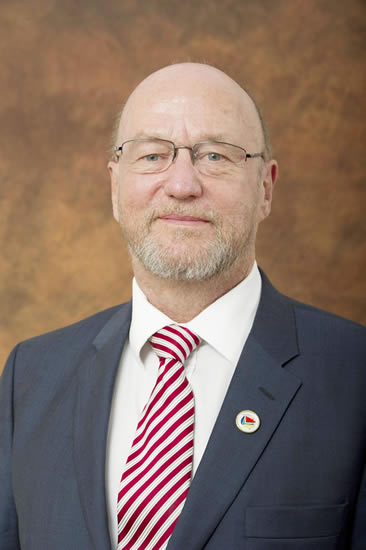 Derek Hanekom is the Minister of Tourism in South Africa. He has held the position since May 2014.
Derek Hanekom is the Minister of Tourism in South Africa. He has held the position since May 2014.
About the Minister
Minister Derek Hanekom was born in Cape Town on 13 January 1953. He did his schooling in Cape Town and matriculated from Jan van Riebeeck Secondary School in 1970.
Between 1994 to 1999 he was appointed Minister of Agriculture and Land Affairs, piloting various reform bills through Parliament which aimed to redress the injustices and inequities caused by apartheid laws and the 1913 Land Act.
Prior to his current position, Minister Hanekom served as a Member of Parliament on various Parliamentary Committees until his appointment as the Deputy Minister of Science and Technology in April 2004. In October 2012 he was appointed to Minister of Science and Technology, a position he held until May 2014.
About the Department
The National Department of Tourism is mandated to create conditions for the sustainable growth and development of tourism in South Africa.
The Tourism Act makes provision for the promotion of tourism to and in the Republic and for regulation and rationalisation of the tourism sector, including measures aimed at the enhancement and maintenance of the standards of facilities and services utilised by tourists; and the coordination and rationalisation of the activities of those who are active in the tourism
sector.
Kokstad entrepreneurs get a boost
Kokstad entrepreneurs get a boost lebangThe KwaZulu-Natal Government has handed over multi-million rand infrastructure projects to the Kokstad Municipality to make backyard operations more professional.
The Provincial Treasury handed over R40 million infrastructure in the form of a Light Industrial Park (LIP) and the Shayamoya Echo Park (SEP).
An amount of R22 million was allocated to the LIP, which aims to identify emerging entrepreneurs who work in their backyards and train them to run their businesses professionally.
The entrepreneurs will be awarded with certificates so that they can break into the mainstream economy.
The R18 million allocated to SEP will stimulate a number of employment opportunities for local people to look after the park.
It will also promote social cohesion amongst different race groups in the area, while teaching communities about caring for the environment and also promoting tourism.
Speaking during the handover, Provincial Treasury Department Head Simiso Magagula said government wants to stimulate economic growth in the Kokstad Municipality.
Magagula said the facility will serve as an incubator for small scale entrepreneurs, who are currently operating in their backyard.
“The facility will give them skills to be competitive and to run successful business entities. That will enable them to get into the mainstream economy in this municipality,” said Magagula.
He added that Treasury will be part of a steering committee that will oversee the running of the facilities to ensure that the facilities work properly.
MEC for Human Settlements and Public Works, Ravi Pillay, said the facelift that the town is undergoing will ensure that it is more attractive to investors.
“This town is also a strategic route for the province, as it is the link between the province and the Eastern Cape, with many travellers seeing it as a half way point,” said MEC Pillay.
Kokstad resident, Mayor Nosisa Jojozi, said it was exciting to see the municipality taking a leap into stimulating economic growth in the area.
“Today we realise our dream. There is no time to waste - we will hit the ground running,” said an excited Jojozi.
The Department of Cooperative Governance and Traditional Affairs has also invested R46 million in the town to rehabilitate infrastructure.
Over the past five years, over R400 million has been spent under the Small Town Rehabilitation Programme to rehabilitate small towns across the province.
The towns, which have gained more investments through the programme, include Umzimkhulu, Richmond, Dannhauser, Weenen, Greytown, Endumeni and Okhahlamba.
Let’s make SA an even better place
Let’s make SA an even better place JoyJobs, jobs and more jobs: this is the key focus – call it obsession – of government as we find ourselves halfway through the five-year political term that began in 2014.
Government understands the hardship and insecurity experienced by millions of South Africans who do not enjoy the dignity and material comforts that come with having any form of employment.
While this hardship is felt in households, it is also felt by businesses that will only sell products or services to people who have jobs. And if businesses fold, even more jobs are lost, poverty and inequality grow, and South Africa becomes an unattractive place for its own citizens and for investors from elsewhere.
South Africa’s masses of unemployed people were uppermost in our minds when Cabinet met in Pretoria from 16 to 19 August 2016 to look at what we can do – not as government alone, but in partnership with all sectors of our society – to kick-start our economy and keep our National Development Plan on track.
Cabinet reflected deeply on the factors inside our own country and around the world that are putting a brake on economic growth and decided on a number of actions to secure lasting growth and social development for the country.
Ultimately, the Cabinet Lekgotla served as a “GPS” for our economic recovery and further improvement of the quality of life for all South Africans. Lekgotla was, therefore, a source of hope at a time of economic difficulty.
The achievement of growth and development will only succeed if government, civil society, business and labour roll up their sleeves together to improve our economic prospects.
To ensure maximum impact, government will focus on programmes with the greatest potential to create jobs in the shortest possible time. Cabinet agreed that government will make it easier and worthwhile for businesses in sectors such as clothing, textiles, leather and footwear to operate and take on staff. Agro-processing and business process services (including call centres) are among the other businesses that will benefit from incentives.
As President, I am Chair of the Inter-Ministerial Committee on Investment that will coordinate 40 projects in which government will invest as a matter of urgency. These include agro-processing and agri-parks. As government, we are concerned that too much of our nation’s farm produce leaves our farming areas in their raw state, before being processed and packaged elsewhere.
Energy and infrastructure, manufacturing and services projects will also be top of our priorities.
We are looking into these sectors because we believe in their ability to have a major impact on our economy; they will be able to take off in the next two years, and they will attract investment beyond government.
In the next six months, government will introduce changes to the law that will make it a rule that 30 percent of government procurement should be awarded to small, micro and medium enterprises, township cooperatives and rural enterprises.
As the biggest spender in the economy, government’s buying power will therefore bring new business opportunities to parts of the country and sectors of our economy that have been excluded from such procurement before.
By procuring goods and services from the private sector – big and small – government stimulates business activity which in turn stimulates job creation and increases the amount of taxes collected by the South African Revenue Service.
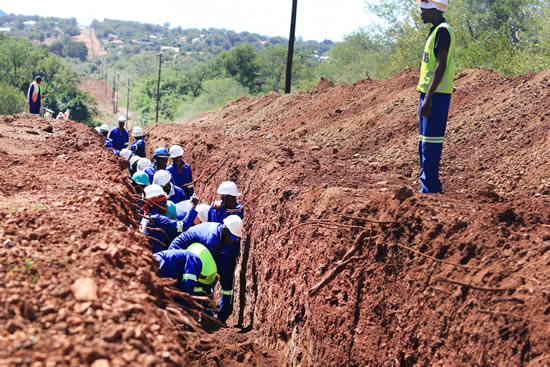 More taxes mean more services and more services mean a better life for all South Africans.
More taxes mean more services and more services mean a better life for all South Africans.
At the Lekgotla, Cabinet also paid attention to the need for South Africa to save water and minimise water losses. We are a water-scarce country where we need to work seriously and smartly to keep water available for domestic, industrial and recreational use.
Later this month, national government will conclude agreements with municipalities with high water losses, to help them reduce such losses.
Given South Africans’ quick adoption of new technologies and the positive impact of technology on service delivery, Cabinet agreed to speed up implementation of the South African Connect Strategy to connect schools, health facilities and government offices.
The Cabinet Lekgotla looked at our country from all angles, to ensure that government stays true to its Programme of Action, which is based on the 2014 Manifesto of the African National Congress.
That Manifesto placed the spotlight on radical socio-economic change in the country, and prioritised the creation of education and business opportunities for the millions of South Africans who were denied such opportunities under apartheid.
Following the Lekgotla, we now invite all South Africans to work with government in making our plans and programmes a reality and to share their ideas for making South Africa an even better place.
Halfway through the political term, we have reason for hope, based on what we have already achieved.
But, as our great Olympic 800m champion, Caster Semenya, showed us just a few days ago, it is once the bell goes for the second lap that the action really hots up.
In our second lap, we will move South Africa forward even faster.
Local government must focus on the future
Local government must focus on the future lebangThe successful local government elections held on 3 August build on the solid foundation laid by local government over the past 15 years.
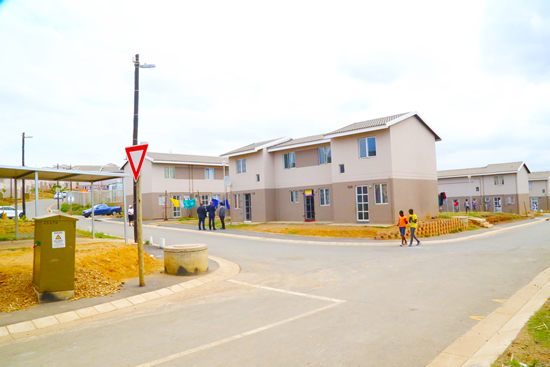 During this time remarkable progress has been made in speeding up the provision of basic services to the poor.
During this time remarkable progress has been made in speeding up the provision of basic services to the poor.
The recent elections were an important milestone that further contributed to building a strong democratic South Africa. It is also encouraging that the combined efforts of all stakeholders ensured that they were largely incident free.
Now that the people have spoken, we must look to the future. New mayors and councillors have been sworn in throughout the country and it is important that we give them the support they need to provide efficient services to communities.
Central to providing effective and efficient services will be the flagship programme of the Department of Cooperative Governance and Traditional Affairs, the Back-to-Basics (B2B) Programme.
This is a programme that is underpinned by five major pillars, namely: putting people first; sound financial management; good governance; service delivery and building capable local government institutions.
According to the Municipal Structures Act, municipal managers of municipalities have 14 days from the elections within which to call the first council meetings.
Newly sworn in mayors and councillors, just like their predecessors, will have to familiarise themselves with the B2B programme and lead by example in putting people first, and managing government funds appropriately.
For the incoming administration to do their job correctly, provincial governments should play a key role in assisting municipalities in managing the various transition measures that will take place in new councils that have been formed.
In an effort to improve service delivery, we have reduced the number of municipalities from 278 to 257. The metropolitan municipalities will still remain unchanged at eight and the 44 district municipalities will also remain unchanged.
Looking back at the successful local government elections, we can take pride as a country on how our institutions like the Independent Electoral Commission handled the elections.
Even in those councils where there was no outright winner, our legislation provided for mechanisms to address the challenge of hung municipalities.
From now, we need to encourage the new councils to work closely with the communities they serve to render services.
Government encourages big business, civil society, the academia and all strategic sectors of the economy to assist the new councils because it is important that we all work together and pull in the same direction.
Lodge brings change to Limpopo community
Lodge brings change to Limpopo community lebangThe community of Kolobetona in Mamaila, Limpopo, and surrounding areas are benefitting from the opening of the Nahakwe Lodge in the area.
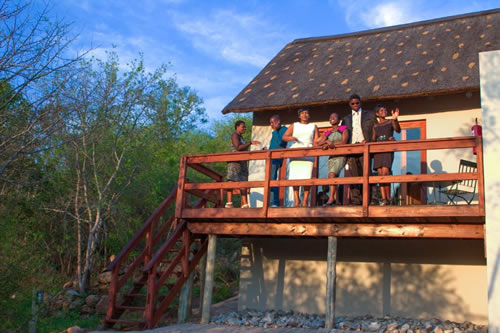 Nineteen young people from the area have been permanently employed at the lodge while opportunities have also been created for local businesses.
Nineteen young people from the area have been permanently employed at the lodge while opportunities have also been created for local businesses.
The lodge was opened as part of the Department of Tourism’s Social Responsibility Investment project.
Minister of Tourism Derek Hanekom encouraged the lodge’s management to take extra care of the lodge.
“This marks the beginning of a new chapter for the management of the lodge. It should not happen that when we come back after five years this place does not look good,” he said.
An investment of R28.5 million was made into Nahakwe Lodge and total of 90 local people were employed during the construction phase.
Throughout the construction of the lodge, beneficiaries received accredited and non-accredited training and were equipped with
knowledge that they can use in future.
Lefa Mogale, an employee at the lodge, said it has brought change to the community because it has created jobs.
Mogale said that those employed during the construction received skills and experience that will benefit them for life.
“Of the people who were employed here during the construction phase, 90 percent of them got jobs somewhere. This goes to show that the skills they have were of high quality and value.”
He added that local entrepreneurs are also benefitting as some of their sculptures, beads, crafts and other creations were bought by the lodge and sold to the visitors.
* Thomas Mokou works for the Department of Tourism.
Macadamia brings hope
Macadamia brings hope lebangResidents of Ncera village outside of East London are benefiting from a macadamia farm project recently launched in the area.
 Macadamia are edible nuts.
Macadamia are edible nuts.
Indibano Projects, an initiative that aims to empower women and youth in rural Eastern Cape, is spearheading the expansion of macadamia plantations.
The expansion is being implemented at the AmaJingqi traditional locality in Willowvale, under Chief Dumalisile.
“We joined EC Macadamia, that was already working in Ncera Farms as fundraising partners, for the extension of the macadamia project in Eastern Cape. We’re fundraising for everything new as far as macadamia plantations in the province,” said Lindiwe Hendricks founding member of Indibano Projects.
The 300 hectare Ncera site produces 50 000 tons of macadamias a year.
“This year the yield has grown to 80 000 tons and Ncera site has been hailed as the best site in the country in terms of the quality of nuts it produces,” said Hendricks.
In the Pondoland area, Indibano is investigating areas most suitable for macadamia plantations.
Rural people, particularly women and youth, have been empowered with skills they previously lacked, Hendricks said.
“My satisfaction comes from the fact that I see lives changing. I see women that had no hope running orchards …. That makes me so proud.”
She added that the success of the current macadamia nut projects illustrates that wealth creation is possible in rural areas.
“We have responsibility to pull people out of poverty and make sure that there is wealth creation in the rural areas, to stop this massive migration of kids wanting to go to cities.”
More funding for municipal infrastructure
More funding for municipal infrastructure JoyCabinet has made a key decision to put in more resources into municipal infrastructure, especially for maintenance, says Minister in The Presidency for Planning, Monitoring and Evaluation, Jeff Radebe.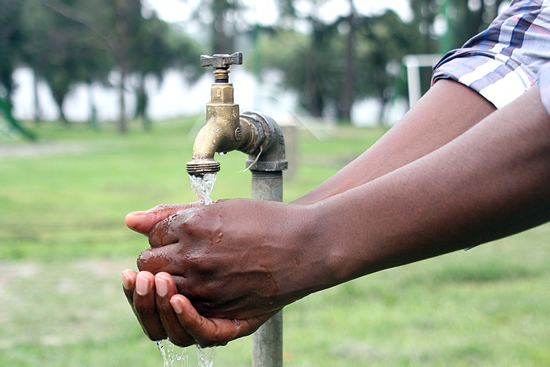
Speaking after the recent Cabinet Lekgotla, the Minister said it provided an opportunity for Cabinet to reflect on the implementation of government’s programme of action and the implementation of the National Development Plan (NDP).
He added that there was an action plan to ensure that more is spent on municipal infrastructure maintenance and enforce proper financial asset management to extend the lifespan and quality of the infrastructure assets.
“Approximately R1.3 trillion of assets are at jeopardy because of non-maintenance. The issue of maintaining the infrastructure that we have plays a key role in advancing the agenda of the NDP, so the financial asset management in municipalities must be strengthened,” said the Minister.
In line with the proper management of municipal infrastructure, the Minister said water saving and minimising water losses continues to be government’s priority.
“By September 2016, agreements are to be complemented with municipalities with high water losses … and a clear funding model is to be completed,” he added.
New health facility for NW
New health facility for NW Estelle GreeffElderly people with mental disorders will now receive specialised care with the opening of the new Geriatric Psychiatry Care Unit situated at the Witrand Hospital in the North West.
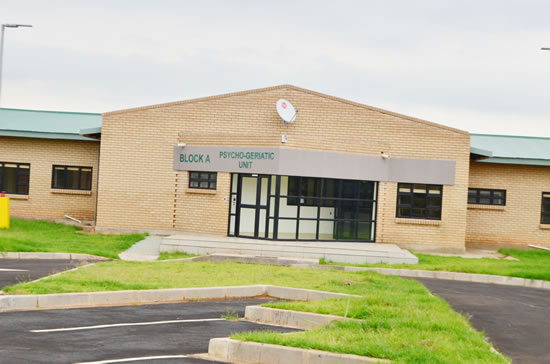 “This is the first of its kind in the province and it ushers a new era of quality mental health care services, not only to the people of Dr Kenneth Kaunda District Municipality, but to the residents of the North West Province as a whole,” said the Chief Executive Officer of the Witrand Hospital Naledi Mocwaledi-Senyane.
“This is the first of its kind in the province and it ushers a new era of quality mental health care services, not only to the people of Dr Kenneth Kaunda District Municipality, but to the residents of the North West Province as a whole,” said the Chief Executive Officer of the Witrand Hospital Naledi Mocwaledi-Senyane.
Geriatric psychiatry is a specialty of psychiatry dealing with the study, prevention, and treatment of mental disorders in people of old age, such as dementia.
The North West Department of Health also opened a Community Psychiatric Unit at Witrand Hospital.
The department spent over R147 million building the facilities. The Geriatric Psychiatry Care Unit has 38 beds while the Community Psychiatric Unit has 60 beds.
This newly-built state-of-the-art facilities will provide care and assessment to referral patients from across the province.
Mocwaledi-Senyane said both units will operate on a referral basis and during their stay patients will be assessed by specialists such as doctors, occupational therapists, geriatric psychiatrists, nurses, physiotherapists, rehabilitation assistants, pharmacists, social workers nurses and dieticians.
Health MEC Dr Magome Masike said health infrastructure has grown significantly since 1994.
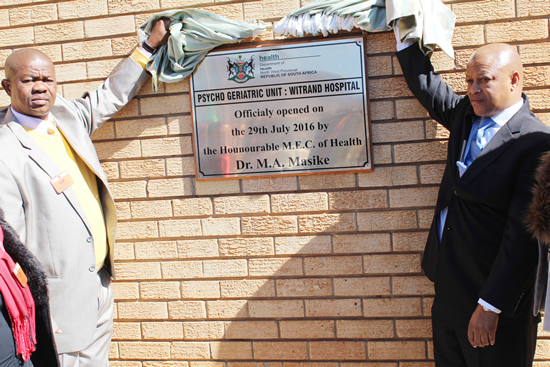 “Every new financial year the department has been building new clinics and community health centres,” said MEC Masike adding that despite this his department still needed to do more.
“Every new financial year the department has been building new clinics and community health centres,” said MEC Masike adding that despite this his department still needed to do more.
“We have no time to rest in our quest to address health service delivery backlogs particularly in ensuring access to decent and quality health care services.
The MEC also urged the community to use primary health care facilities such as clinics and community health centres because not all illnesses need the services of a hospital and some can be treated at clinic level.
He encouraged communities and community leaders to look after the new facilities as they are essential to their health and that of the future generation.
MEC Masike said the department is serious about taking mental health services closer to communities.
Hospitals such as Mafikeng Provincial Hospital and Tshepong Hospital are now listed as 72-hour psychiatric observation units where only observations will be done.
MEC Masike said the purpose of the 72-hour assessment is to establish the cause of the patient’s symptoms. Patients are assessed daily by a medical doctor, psychiatric trained registered nurse and a psychiatrist.
This means that once the observation is completed, the patient will be transferred to the nearest designated hospital for further care, treatment and rehabilitation.
*Thebe Itumeleng works for the North West Department of Health.
News in Brief
News in Brief JoyHigh school learners get bursaries
The Department of Water and Sanitation, in partnership with the Department of Education, have awarded three learners from Setumo High School in Mahikeng in the North West with science and engineering bursaries.
Keitumetse Sebokanelo, Ontlametse Banda and Mmabatho Pule were awarded the bursaries after they excelled in public speaking competitions that target mathematics and science learners.
They will be studying for free at tertiary level in three years’ time. Already armed with bursaries and guaranteed employment, this encourages learners to work harder on their studies.
Second dose of HPV vaccine rolled out
As part of the ongoing campaign to protect girls against cervical cancer, the Gauteng Departments of Health and Education are rolling out a province-wide second dose vaccination campaign to protect girls from being infected with Human Papillomavirus (HPV).
All the Grade 5 girls who received their first HPV dose in September 2015 are now due for their second HPV dose.
The second phase has been running from 2 August and will continue until 6 September 2016.
Call centre to boost service delivery
Communities across the country are set to benefit from the services of the re-established Department of Water and Sanitation (DWS) call centre.
The call centre will operate in all 11 languages. The hotline number is 0800 200 200 and the operating hours are: weekdays from 6am to 10pm and weekends from 8am to 4pm.
Protect your social grant
Protect your social grant JoyThe South African Social Security Agency (SASSA) has urged social grant beneficiaries to make other arrangements with financial service providers to pay their premiums.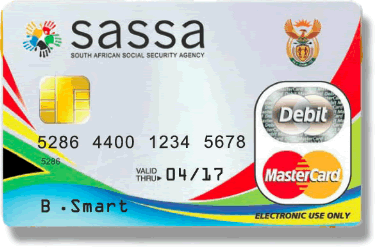
This follows the amendments of the regulations of the Social Assistance Act of 2004, where some social grant beneficiaries will have to make other arrangements regarding the payment of funeral insurance premiums.
The amendmens of the regulations was a necessary and responsible step taken by SASSA and the Department of Social Development in order to protect vulnerable beneficiaries against dishonest financial service providers.
“The law allows for only a maximum of 10 percent of the grant value to be deducted and requires that SASSA should be informed whenever a beneficiary enters into a contract with a funeral insurance service provider.” “In some cases, SASSA is not involved and this results in unauthorised deductions which come as a surprise to the beneficiary when the next payment cycle comes. This happens when beneficiaries are approached and made to sign agreements that are not explained to them,” said Diseko.
Ten percent of R1 500 (old age grant) equals to R150 per month.
Following the complaints, Minister of Social Development Bathabile Dlamini appointed an advisory committee which recommended a dispute resolution mechanism.
“SASSA developed this mechanism, which helps beneficiaries to report such unauthorised deductions which are investigated and resolved to a large extent.
Direct Deductions
Beneficiaries with direct deductions for a funeral insurance/scheme from child grants will be discontinued in December 2016.
Direct deductions for a funeral insurance/scheme on any social grant awarded for a period of less than 12 months (temporary disability grants) will be discontinued in December 2016.
“If you are receiving a grant for older persons, war veterans or a permanent disability grant and would like to have the premiums for your funeral policy/scheme deducted directly from your grant, please visit the nearest SASSA office to give permission, in writing and in person, for these deductions to go through.
“This applies to old and new funeral policies. If you are unable to visit the SASSA office, contact SASSA on 0800 60 10 11 or 012 400 2322 to make other arrangements such as home visits for frail people,” Diseko urged beneficiaries.
Regarding other types of social grants, Diseko said only one deduction will be allowed provided the value of such a grant does not exceed 10 percent of the value of the grant.
For more information call: 0800 60 10 11
or 012 400 2322
R75 million heritage museum for eThekwini
R75 million heritage museum for eThekwini lebangResidents of KwaZulu-Natal will soon be able to learn more about their heritage while also having access to much-needed job opportunities.
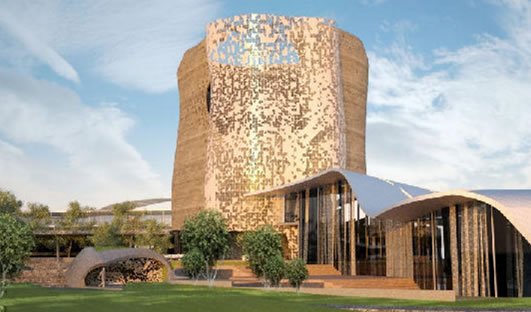 This as the construction of the R75 million ultra-modern uMkhumbane Cultural and Heritage Museum in Cator Manor in the eThekwini Municipality in KwaZulu-Natal is nearing completion. Cato Manor is situated about the five kilometers from the centre of Durban.
This as the construction of the R75 million ultra-modern uMkhumbane Cultural and Heritage Museum in Cator Manor in the eThekwini Municipality in KwaZulu-Natal is nearing completion. Cato Manor is situated about the five kilometers from the centre of Durban.
The project is expected to revive the Cato Manor area, preserve heritage and boost tourism.
The museum, which will officially open later this year, is a green building and is in line with the eThekwini Municipality’s green strategy.
The precinct will include a heritage centre, a forced removal museum, a memorial of Queen Thomozile, concession and trade building, as well as a Freedom Park.
The contractors are now adding the final touches to the museum, which is part of phase two of the cultural and heritage precinct.
Deputy Head of Libraries and Heritage at the eThekwini Municipality, Guy Redman, said the museum is an historical landmark and cultural tourist attraction which would not only preserve the Zulu nation’s rich cultural heritage, but would also revive the history of Cato Manor.
“Our aim is to also transform the Cato Manor community, create employment opportunities and alleviate poverty in the area. Through this museum, we will be able to tell our own stories and educate people about our rich heritage,” said Redman.
The museum will also house the offices of the Zulu monarch. In 2011, during the reburial of King Goodwill Zwelithini’s mother, Queen Thomozile Jezangani Ndwandwe Zulu, the eThekwini Municipality stated it would build a R300 million precinct to commemorate Zulu heritage.
Every year the King Goodwill Zwelithini Foundation and the eThekwini Municipality hold an annual Queen Thomozile weeklong memorial event.
The event aims to promote tourism and boost the economy of Cato Manor and the City. The celebrations are filled with of cultural activities and they bring together people of different races and backgrounds.
This year’s celebration will take place in September in line with Tourism and Heritage Month. The museum gives community members and learners an opportunity to tell thier stories and learn about their heritage.
*Simphiwe Dlamini works for the eThekwini Municipality
Rural economy uplifting lives
Rural economy uplifting lives lebangAn initiative in rural areas in the Eastern Cape is making strides in empowering women and youth.
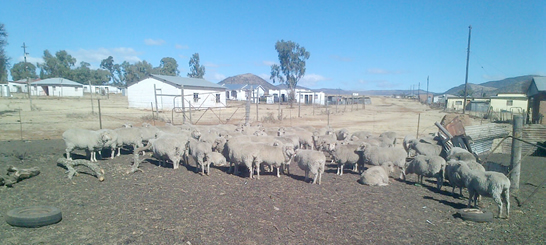 A number of communities are reaping the benefits of Indibano Projects, an organisation chaired by former Minister Lindiwe Hendricks.
A number of communities are reaping the benefits of Indibano Projects, an organisation chaired by former Minister Lindiwe Hendricks.
Indibano Projects works with rural communities to achieve economic development. Its role is to raise funds for development projects, mainly in agriculture, and to connect rural communities with relevant stakeholders.
Indibano was formed by Phambili Vuna, a company owned by Hendricks and her husband, auditing firm PwC, and Kula Investments, an East London-based company that focuses on rural development projects.
“The whole notion behind Indibano is to plough back. We can see that government can’t be everywhere and is calling on the private sector to come on board to make rural development happen,” said Hendricks.
The project assisted the Zulukama community near Whittlesea, where locals operate wool hubs to get access to the market.
“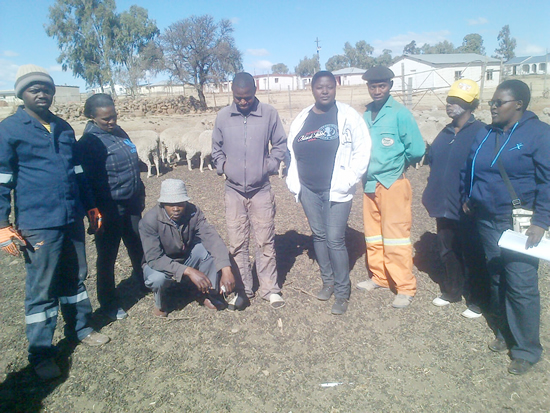 We got partners such as Amathole District Municipality to come on board. The municipality donated ewes and rams and the community members were trained in sheep shearing and breeding,” said Hendricks.
We got partners such as Amathole District Municipality to come on board. The municipality donated ewes and rams and the community members were trained in sheep shearing and breeding,” said Hendricks.
The Zulukama Community Trust now has seven sheep cooperatives, each with 100 ewes and four rams, making the total 728 sheep. The number of sheds has increased to 22 since inception in 2006.
Hendricks said the success of the wool hubs demonstrates that there is wealth in rural areas.
SA making progress in digital migration
SA making progress in digital migration Estelle GreeffSouth Africa is making solid progress in its digital migration campaign, says the Department of Communications Chief Director: Digital Migration Programme Management Office, Dr Fhatuwani Mutuvhi.
Dr Mutuvhi said the digital terrestrial television (DTT) connections made in the core towns of the Square Kilometre Array (SKA) in the Northern Cape are testament that the country is making progress.
The connections, Dr Mutuvhi said, were completed in June this year. Over 3 700 households in Carnavon, Vanwyksvlei, Brandvlei, Vosburg and Williston have fully migrated to the digital broadcasting platform.
“We can proudly tell South Africans that all old-fashioned analogue transmitters in the core of the SKA area are ready to be switched off. This is a clear confirmation that as government, we are on course towards switching off all analogue transmitters in the country,” he said.
Government will announce the switch-off date for analogue broadcasting when more than 80 percent of households have been migrated to digital broadcasting.
The world is going through a television revolution of migrating from analogue to digital broadcasting. Digital broadcasting works by translating sound and pictures into digital data rather than analogue waveforms. Digital broadcasting technology is superior to analogue broadcasting technology, with the latter being phased out worldwide.
Residents living in the SKA community of Keimoes and Kai Garib in Northern Cape province were the first people in South Africa to experience DTT following the unveiling of the registration process for STBs in the area on 3 October 2015 by Minister Faith Muthambi.
Subsequent to this, Communications Minister Faith Muthambi launched the first installation of government subsidised set-top boxes (STBs) in Keimoes in December 2015.
Government is rolling out subsidised STBs in a provincial phased approach, as it has already started in the Northern Cape. More registrations are underway in the Free State, Mpumalanga and Limpopo.
Poor households who qualify for the government subsidy are urged to register for free STBs at their local Post Office branches.
Registrations will open in the North West, Eastern Cape, KwaZulu-Natal, Western Cape and Gauteng at a later stage.
Sewing business a growing success
Sewing business a growing success lebangFrom an early age Ntshepeng Mofokeng (34) always wanted to be the owner of a business. After completing matric she considered a career in music and tried her luck in the retail and banking industries but the urge to become a businesswoman remained.
 “Even when I was working, the dream of owning my own business was still there. After I left the bank and I started to think seriously about making my dream a reality,” said Pimville-born Mofokeng.
“Even when I was working, the dream of owning my own business was still there. After I left the bank and I started to think seriously about making my dream a reality,” said Pimville-born Mofokeng.
Once she had decided on the type of business she wanted to run, she approached the National Youth Development Agency (NYDA) for assistance with funding.
“I was very skeptical about the NYDA because of the stories that I’d heard about them.
“I must say, so far, they’ve proven me wrong and the assistance and guidance I got from them have been wonderful.”
Her business, Tsa Motse Lifestyle Concepts, was given a grant funding of R50 000 as a start-up.
“I was very happy, in fact I was extra happy when my business was chosen because it showed that I was on the right-track and was doing something right.”
Mofokeng’s business creates curtains, cushions, blinds, bedding and also does interior design. She currently employs four people, two on a permanent basis and two as temporary workers.
“My target market is mostly private individuals, new homeowners, the hospitality market – especially big hotels. That’s the direction I want to take this business in.” Mofokeng added that she has plans to expand into other markets.
She said one of the major challenges she faces as a small business owner is competing with well-established brands in the textile industry.
“It is a serious challenge but we try by all means to offer our clients a unique experience. We even offer to wash the curtains for our clients and we offer a high level of professionalism and reasonable prices.”
Mofokeng said she would like to see her company grow and create more jobs in the future.
www.tsamotse.co.za
Tel: 011 933 3617
E-mail: ntshepeng@tsamotse.co.za
Small businesses get a boost
Small businesses get a boost JoyGovernment has given South African small businesses and cooperatives a lifeline. 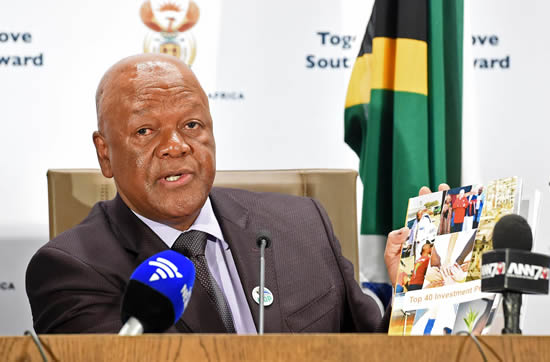
This after government announced that it has set aside 30 percent of its procurement spend for services from small businesses, and cooperatives.
Minister in The Presidency for Planning, Monitoring and Evaluation, Jeff Radebe, announced this shortly after the Cabinet Lekgotla held recently.
He said a new Procurement Bill developed by National Treasury that will be introduced next year, would ensure that 30 percent of government contracts are set aside for small companies, cooperatives and township businesses.
“Government would introduce legislative amendments to implement the 30 percent set aside to unlock the potential of SMMEs, cooperatives and the township and rural enterprises. This would be done by March 2017,” said Minister Radebe.
He added that this was part of government’s evaluations of financial incentives for business to strengthen and achieve greater value for money to enhance more inclusive growth.
Government will continue to focus on labour-intensive sectors, including the need for various mechanisms to support greater impact on jobs, such as the use of the incentive programmes, amongst others: clothing, textiles, leather and footwear value-chain; agro-processing and business process services.
The economy was top of the agenda at the Cabinet
Lekgotla as government assessed its mid-term performance.
Cabinet is working on reprioritising the budget to align it to the National Development Plan (NDP) and the Medium-Term Strategic Framework (MTSF).
“National Treasury and the Department of Planning, Monitoring and Evaluation presented their recommendations on work done in the past year to align the national budget to the NDP and the MTSF,” Minister Radebe said.
Government has also identified a set of budget priorities for 2017/18 that focus on maintaining infrastructure spend, strengthening support for skills development and maintaining real levels of spending on the poor.
Work on identifying efficiencies and savings over the remainder of the Medium-Term Expenditure Framework will continue, said Minister Radebe.
The Minister also said that the Inter-Ministerial Committee on Investment will coordinate 40 projects in which government will invest. These projects include agro-processing and agri-parks to ensure that farmers are able to not only produce, but also process and package goods.
Cabinet also discussed energy and infrastructure, manufacturing and services projects that will be a top priority for government.
As the country struggles with water shortages, government encouraged South Africans to save water and minimise water losses. “By September 2016, agreements are to be completed with Municipalities with high water losses, to facilitate placement of agents, and a clear funding model is to be completed.”
Solution to KZN traffic challenge creates landmark
Solution to KZN traffic challenge creates landmark lebangPeak hour traffic jams will be thing of the past for motorists travelling between uMhlanga and the KwaZulu-Natal north coast with the completion of one of the longest structures ever built in South Africa.
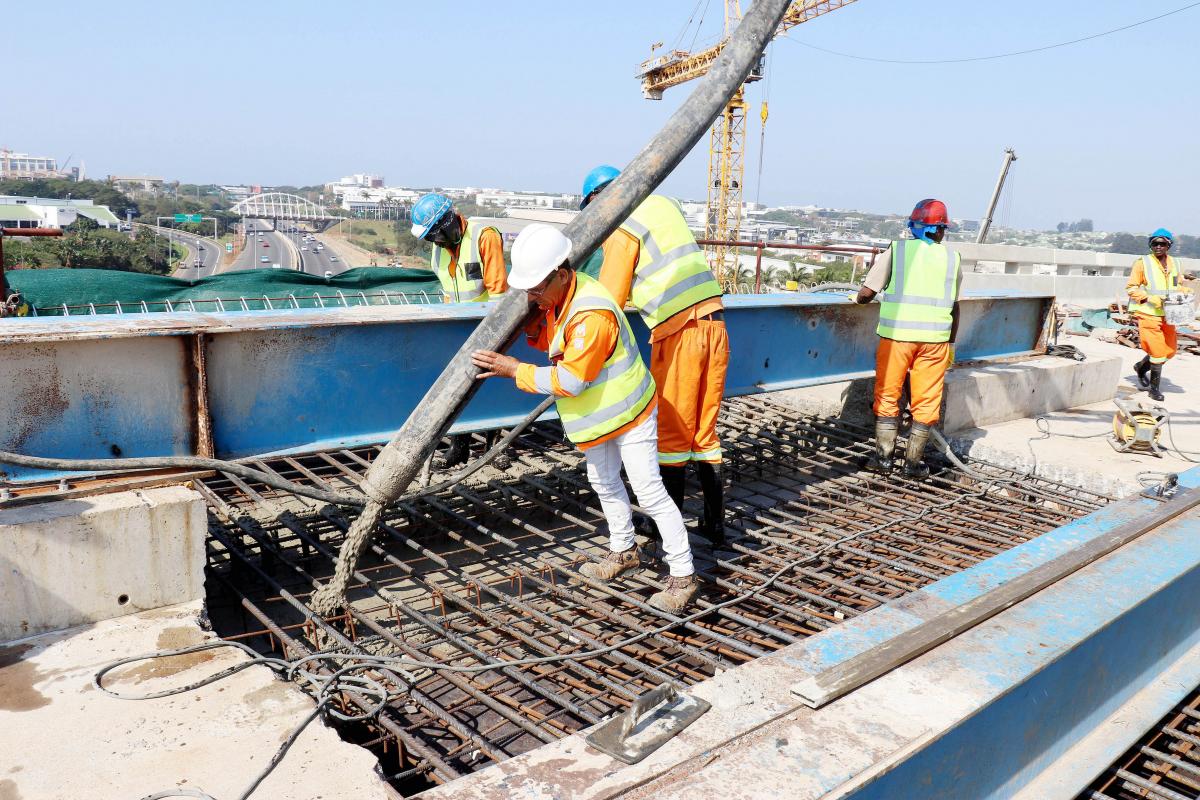 The one kilometre-long incrementally launched bridge forms part of the improvements undertaken by the South African National Roads Agency (Sanral) at the N2/M41 Mt Edgecombe Interchange, north of Durban.
The one kilometre-long incrementally launched bridge forms part of the improvements undertaken by the South African National Roads Agency (Sanral) at the N2/M41 Mt Edgecombe Interchange, north of Durban.
The interchange was built over one of the province’s busiest intersections without the need to close any of the roads permanently, using an incremental launching technique.
Incremental launching involves casting 12 to 30 metre-long sections of the bridge superstructure on site and then pushing the completed section forward along the bridge axis.
Improving traffic flow
The project manager for Sanral’s eastern region, Corné Roux, said due to the expansion of the uMhlanga and La Lucia Ridge areas, the existing interchange had been operating at capacity, with vehicles backing up on the M41 and onto the N2 in peak hours.
“An additional 40 000 vehicles enter or leave the N2 from the M41 daily, resulting in substantial queuing of vehicles during the day. This, together with expected future expansions and the anticipated development of the Cornubia area, required the existing interchange to be upgraded in order to improve the flow to and from the N2 and M41 to the supporting road network,” he said.
“Constructing one of the longest structures ever built in South Africa over one of the busiest intersections in KwaZulu-Natal successfully, without ever closing any of the roads permanently, bears testimony to the success of the selected construction methods and materials,” he said.
Roux said the Mt Edgecombe interchange upgrade has changed the landscape forever and is sure to become a well-known landmark in years to come.
Gert van Schalkwyk, resident engineer (structures) for consulting engineers SMEC South Africa, said Bridge B0215 has a deck length of 947m, which not only makes it the longest incrementally launched bridge in the southern hemisphere, but also one of the longest structures in South Africa.
It has 23 piers, of which the highest is 26m, with typical spans of 42m. The longest span is 50.5m.
World-class engineering
What sets B0215 apart is not only its sheer size and length, but also the fact the bridge was constructed in two decks which were both incrementally launched from opposite sides.
“Given the size of the decks and the fact these decks were launched from the two opposite ends of the site, [the accuracy of the] final position is a testimony to the workmanship and world-class engineering capabilities in South Africa,” said Van Schalkwyk.
Taking Freedom Park to the People
Taking Freedom Park to the People JoyIn an effort to encourage more people to visit Freedom Park, CEO Jane Mufamadi and her team embarked on an extensive outreach programme to market the park.
She said they’ve taken the outreach programme to the Free State, Western Cape and Mpumalanga.
“The support we got from these provinces has been immense and we are planning to talk to other provincial departments, especially the departments of arts and culture, to support us in marketing Freedom Park.”
She added that since the outreach campaign there has been increased interest in the park and she is certain that the number of people visiting the park will increase.
“South Africans are warming up to Freedom Park as a tourist destination.
“We believe there is nothing stopping us from reaching 100 000 visitors in three to five years’ time. The highest figure we recorded was 54 000 annually. This year we are on course to reach
60 000 visitors.” This year Heritage Month will be celebrated unde the heme:”Human Treasures and Legends: Our Living Heritage.
Opening times:
Freedom Park is open seven days a week from 8am - 4:30pm
For more information call:
012 336 4000
or visit:
www.freedompark.co.za
Entrance fees:
For children: R30
For pensioners/disabled: R30
For adults: R50
For overseas visitors: R100
Team South Africa flies the flag high
Team South Africa flies the flag high Estelle GreeffSport, arts & culture

 Team South Africa has made the country proud. The team’s outstanding performance at the 2016 Rio Olympics in Brazil saw it achieve its target of 10 medals.
Team South Africa has made the country proud. The team’s outstanding performance at the 2016 Rio Olympics in Brazil saw it achieve its target of 10 medals.
The target was set by the South African Sports Confederation and Olympic Committee (SASCOC).
The team’s medal haul included two gold, six silver and two bronze medals.
 The two gold medals came from athletics when 400m sprint sensation and world champion Wayde van Niekerk broke American sprint legend Michael Johnson’s 17-year-old world record.
The two gold medals came from athletics when 400m sprint sensation and world champion Wayde van Niekerk broke American sprint legend Michael Johnson’s 17-year-old world record.
Van Niekerk completed the 400m in a new world record of 43.03 seconds.
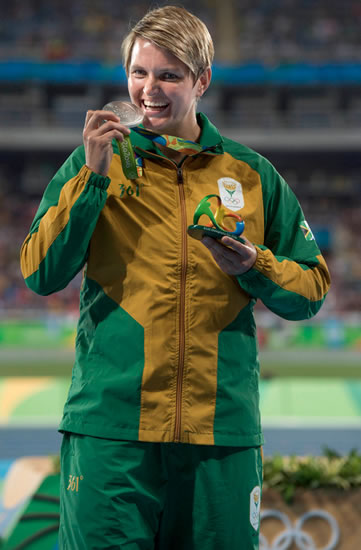 The second gold medal came from the darling of South Africa’s athletics, Caster Semenya, who won her 800m race in a new national record.
The second gold medal came from the darling of South Africa’s athletics, Caster Semenya, who won her 800m race in a new national record.
The 25-year-old went into the race as one of the hottest favourites in sporting history and did not disappoint, winning in 1 min 55.28 seconds.
Other medals came from the swimming pool when Chad le Clos won two silver medals in the men’s 200m freestyle and 100m butterfly. Cameron van der Burgh won also won a silver medal when he came second in the finals of the 100m breaststroke.
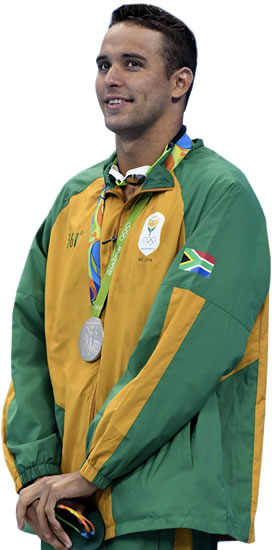 In women’s javelin throw, Sunnette Viljoen took silver with a throw of 64.92m, while the rowing men’s pair of Brittain Lawrence and Keeling Shaun took silver in their race.
In women’s javelin throw, Sunnette Viljoen took silver with a throw of 64.92m, while the rowing men’s pair of Brittain Lawrence and Keeling Shaun took silver in their race.
Luvo Manyonga came second in the men’s long jump to also get a silver medal, while the Springbok Sevens took bronze in the rugby sevens event. Henri Schoeman got a bronze medal for his efforts in the men’s triathlon.
President Jacob Zuma congratulated Team South Africa for an outstanding performance at the 2016 Rio Olympics Games.
“We are immensely proud of the South African team for their outstanding performance at the Olympics Games this year and for making and smashing national and world records.
“The team has once again put the country on the global map and proved indeed that we are a winning nation. We also thank the people of South Africa for their full support of our athletes,” said President Zuma.
Images: www.sascocimages.co.za/Wessel Oosthuizen/SASPA
Rewards for winners
 Gold medal winners
Gold medal winners
R400 000 + R150 000 - Wayde van Niekerk (plus R100 000 to the coach)
R400 000 + R100 000 - Caster Semenya (plus R100 000 to the coach)
Silver medal winners
All silver medal winners will receive R200 000 + R70 000 (plus R50 000 to the coach)
Bronze medal winners
All bronze medal winners will receive R80 000 + R50 000 (plus R20 000 to the coach)
Two new schools for Sekhukhune
Two new schools for Sekhukhune JoyThe Limpopo Department of Education has spent over R73 million building state-of-the-art schools in Greater Tubatse in Sekhukhune.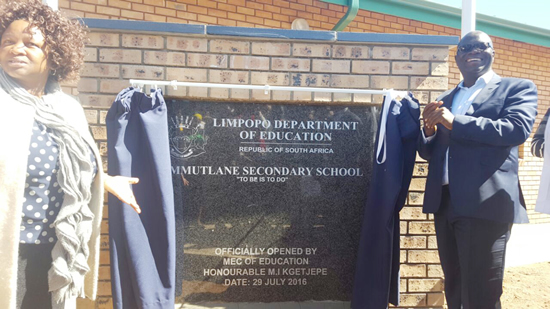
The schools are Mmutlane and Sogane Secondary School. Mmutlane Secondary School now has 12 new classrooms while nine were refurbished. The department also built 16 enviroloo toilets, a nutrition centre and an admin block.
MEC for Education in Limpopo, Ishmael Kgetjepe, said Sogane Secondary School had been equipped with 16 classrooms, 16 toilets, a nutrition centre, an admin block, science labs, a library, computer lab and a school hall.
“We are a government that listens to the people and we urge you to heed our calls when we say let none of these facilities be reduced to ashes,” he said.
MEC Kgetjepe said communities need to stop burning and vandalising schools during protests.
“We can choose methods that are militant during our protests but at the same time such methods must be peaceful and not destroy lives or property.”
He added that building the schools shows that government is serious about making education a priority.
“Our task is to continue with the work of creating conditions in which every learner in every school can access quality education in a safe environment. Our task is to present opportunities for every learner in every school to create a better life for themselves.”
He said it was only education that enables young people to choose opportunities that will make them innovators, and providers of job opportunities to other people.
“The country needs certain skills and expertise and all eyes are on learners of these two schools as to what will become of them.”
MEC Kgetjepe also appealed to educators to be professional in the classroom.
“We appeal to our educators, that they should be at school every day, in class every day and on time teaching our learners. We must trust you, as our educators, with this responsibility.”
He also urged learners to stay away from drugs and not to take weapons to school.
“It will not help you perform as expected. Our girl children must stay away from dating older men and focus on their school work.
“We are challenged to do better and to become better in widening the circle of opportunities for our children.”